Zakelj Diary
Home Page: http://bbhhs96.dyndns.org/~zakeljdiary/
7/10/99
STARTING OVER
IN CLEVELAND
Working in the
Factories
By Anton Zakelj, translated and edited
by John Zakelj
Photographs by Anton Zakelj
Two years ago, Ameriška Domovina
published "Starting Over in America," the story of our family's first
six months in America on a farm in Wisconsin. Wisconsin's Slovenian farmers did
all they could to help our family but, with their small farms, they barely had
enough income to support themselves. We heard there were jobs in Cleveland, so
we reluctantly left the friendly people and beautiful countryside of Wisconsin.
This is the story of our first years in Cleveland. Most of this story is
directly from my diary, with a few missing parts filled in from memory.
I arrived in Cleveland on my 43rd
birthday, June 13, 1950, with my
wife Cilka and my two-year old son Johnny. Mr. Frank Rihtar had moved from Wisconsin a few months earlier.
He obtained a good job and, with the help of his storekeeper friend, Mr. Sušnik,
he bought a small house and agreed to let us use the attic until we could find
better housing. The Rihtar family was already pretty large, but in the refugee
camps, we had become used to having many families living together in one room.
The entrance to our attic apartment was
through the Rihtar's kitchen. The walls of the attic were made of overlaid
boards like the outside walls of a house. The apartment, if you can call it
that, had two electric light bulbs, no toilet, no bathtub, no water, no gas for
cooking or heating, and no furniture. Since the attic had been unused for a
long time, it was covered with dust and soot. This was not surprising, since
the nearby factories were emitting at least one kilogram of soot per square
meter per year. A factory across the street made horrible noises night and day.
They manufactured automobile hubcaps, and large stacks of hubcaps would often
come crashing down. Further down the street was a factory with a heavy metal
stamping machine. When that machine was pounding, glasses in cupboards would
shake -- wherever people had glasses and cupboards.
But if we think about our life in the
refugee camps the previous four and a half years, this was enormous progress.
We had moved from the tents in Vetrinje to the barracks in Judenburg and Trofaich
to a house with a roof that did not leak streams of water whenever it rained.
We now had a church and school nearby, a streetcar stop even closer, and stores
with people who understood us, so we could buy whatever we needed.
At that time, there were so many
refugees coming from Europe that the sponsors didn't have places to put them
all. Mr. Joseph Grdina sponsored many of them and sent them to Mrs. Ana
Hudoklin, who had a small house on E. 61st Street. She was willing to take in
many refugees on a temporary basis and so, her house was called the "D.P.
Hotel." That's what everybody called us - "D.P.'s" -
"Displaced Persons." If Mr. Rihtar had not agreed to let us use his
attic, we would have stayed at the D.P. Hotel.
June 13, 1950
Today is my 43rd birthday.
Yesterday at 2:30, I left Wisconsin with my wife Cilka and my two-year old son
Johnny. In Chicago at 11 last night, we transferred from the Soo Line to
the New York Central train and arrived in Cleveland at 7 this morning. Mr. Rihtar was waiting for us at 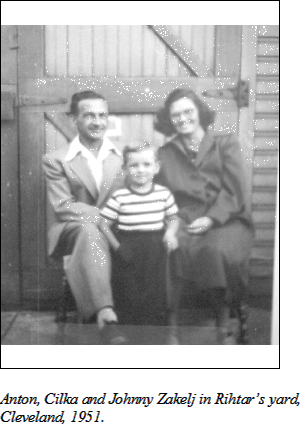 the Terminal Tower station. We took a taxi to
his house at 990 East 63rd St.
the Terminal Tower station. We took a taxi to
his house at 990 East 63rd St.
The Rihtar's house only has 2
bedrooms, and already has two families living in it, but they have agreed to
let us live in the attic until we can find better housing.
The attic consists of two rooms with
overlaid wooden boards on the walls. It doesn't have water or a bathroom and,
since it hasn't been cleaned for a long time, is hopelessly dusty. Mr. Rihtar
said he will install a water pipe; for the time being, we'll carry water from
downstairs. We'll use their bathroom and their refrigerator. Someone gave us an
old gas stove, though there is no gas pipe. We'll use our travel crate for a
dining table. Someone also gave us part of an old bed. The only entrance to our
apartment is from the kitchen below. The entire apartment has two light bulbs.
We need water and gas, so we can do our own cooking.
In the afternoon I washed the walls and
the floor -- everything was so black! Oh, Wisconsin was much more beautiful!
But at least this apartment is better than the tent in Vetrinje (where we spent
our first nights as refugees.)
When we were in Wisconsin, Karl
Erznoznik, who had left before us, had agreed to write and tell us about
Cleveland. Now I know why he wrote so little: he didn't want to say anything
bad, and didn't have anything good to say. This is not the America we imagined
when we were in Europe.
Mrs. Hudoklin invited us to
supper today, and the Rihtar family invited us to lunch.
The Zupans, Sršens and
Erznozniks all came to visit us. Jerry Zupan brought us an old mattress so we
would not have to sleep on the bare floor.
They say that no tent is big
enough for two women, but Mrs. Rihtar will have to be patient with us as we use
her water, her washing machine, bathroom, stove and refrigerator. When Mr.
Rihtar installs water and gas and hopefully a bathroom for us, it will feel
like a deluxe hotel.
Wednesday, June 14,
1950
This morning I went to the
nearby Tanko grocery store to buy some essentials: a loaf of bread, one stick
of butter, the smallest container of milk, the smallest container of flour and
a few other things. I didn't know what to say when the storekeeper asked me
what kind of bread I wanted - Vienna or Italian. I also didn't know what she
meant when she asked if I wanted regular milk or homogenized - that sounded
like a very dirty word to me. I didn't know that American stores give you a
shopping bag if you buy something, so I went to the store with the only
container I had - a large suitcase. There was lots of room left in the suitcase
after I put in my groceries. People laughed.
This afternoon, I went to see
Father Godina and asked where I could get work. He said there are many people
unemployed and few jobs. 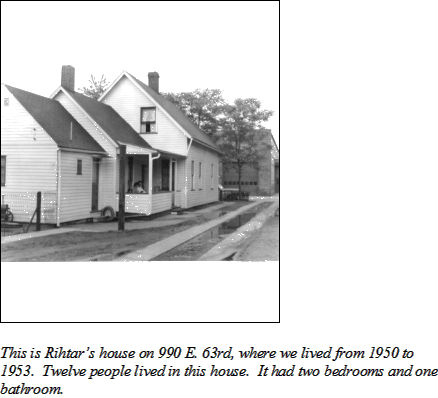
I visited Jerry Zupan and Karl
Erznoznik. They offered beer, whisky and ice cream, but nobody knew about any
jobs. Nobody even knew where I should start looking. They gave me some clothes
for my son Johnny.
Thursday, June 15, 1950
This morning I went to see Mr.
Varšek, who delivers furniture for Mr. Sušnik. He drove his small truck to the
train station so we could pick up our crates from Wisconsin. Everything was in
order.
Friday, June 16, 1950
This afternoon we all went to the
Zupans', where they gave us window curtains, beer and fish. Then Mr. Rihtar and
I carried various furniture from Tanko's to our apartment.
I went with Tone Kocjan to
Fisher Body on Euclid to ask about jobs. Many of our acquaintances have
jobs there. An office worker there made some jokes, but he didn't have any work
for us.
I got my Social Security card
in an office downtown, near Public Square, but I wasn't able to apply for
citizenship because I didn't have the required photos. So Mr. Kocjan and I got
our pictures taken - 6 photos for $2.06.
Kocjan and I also went to the
"Slovenian" factory Z&W Machine Co. on E. 53rd St. and
St. Clair. Again, the jobs had all been taken.
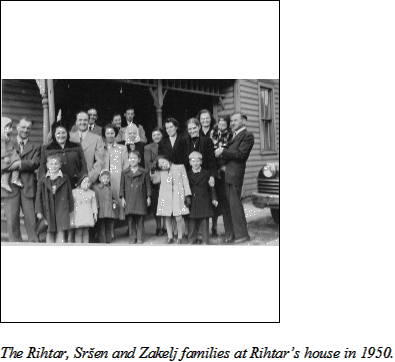
I saw an ad in the Domovina
for jobs on a farm, but I had tried that in Wisconsin and didn't like it.
Saturday, June 17, 1950
At 8 this morning, Karl came by
and said there were jobs at Z&W. I went there immediately, but
there was nothing.
At 9, Cilka, Johnny and I took
the streetcar downtown to apply for citizenship. The office workers were all
very friendly. One of them gave Johnny crayons. Then we visited the New Market.
They had many things for sale, but the prices were about the same as our corner
store. We bought lettuce, oranges and eggs.
In the evening, Rudi Drmota and
Karl Erznoznik visited - they both have good-paying jobs at Fisher Body.
Sunday, June 18, 1950
At 11, we went to our first
Mass at St. Vitus.
In the evening, Miha Sršen and
Tone Zupancic visited till 10:30. All the people who had been in refugee camps
with us are our friends, as if we had all come from the same village.
Tuesday, June 20, 1950
Yesterday evening, someone came
by and told me that two workers had left their jobs at Z&W. I went
there immediately at 8 this morning and went right back out with a paper
authorizing a physical exam at the "fabrik hospital." (The Slovenians
here refer to a factory as "fabrika.") A doctor examined me right
away and determined I was in "average" health. I went home, got some
breakfast, and put on work clothes. At 9:15, I began my job at Z&W.
I unloaded 10-feet long steel bars from a truck, and then helped in various
areas. Lunch was at noon to 12:30, and at 3:30 we were done. All day I was
soaked through with sweat, not really tired, but my back hurt.
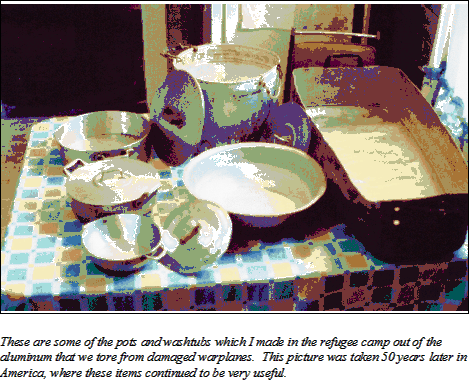 And
so my dream became a reality. I got a job in a Slovenian factory, close to
home. I don't have to take the streetcar, which costs money and which I don't
like. A neighbor told me that Z&W is a good factory; and they must be good
- after all, they do play the radio during lunch time. But the work is
exhausting. Will I be able to endure?
And
so my dream became a reality. I got a job in a Slovenian factory, close to
home. I don't have to take the streetcar, which costs money and which I don't
like. A neighbor told me that Z&W is a good factory; and they must be good
- after all, they do play the radio during lunch time. But the work is
exhausting. Will I be able to endure?
In the evening, Kocjan, Sršen
and Zupancic visited. Kocjan wasn't able to get a job because he doesn't know
any English at all. They said a war started today in Korea. Soon all the
factories will have plenty of jobs.
Wednesday, June 21,
1950
I didn't fall asleep till 4
this morning, but I got up at 7, went to work and had a good day. They had a
coffee break at 8:30 (8 cents a cup). I helped wherever I was needed.
Tony, the foreman, asked me to
clean hundreds of small steel bars. When I got done cleaning them, he asked me
to put them in boxes. When I got that done, he asked me if I had counted the
bars. I said, "No, you didn't ask me to count them." "But you
should known that yourself!" He considered asking me to take them out to
make sure there were a hundred in each box, but he decided it was cheaper to
just leave the extra bars in each box. He was mad and just said, "Leave
it!"
At 4 p.m., I came home, ate
supper and fell asleep. I woke up at 7 in the evening and, thinking it was
morning, got up quickly and got ready to go back to work. My wife pointed out
that it was still evening and suggested I go back to sleep.
Friday, June 23, 1950
Hot today. In the morning I
carried long heavy steel bars from the warehouse to the factory. I set them
next to 8 long machines that are called Automatic Screw Machines. The
machines are designed for automatic production of small pieces in large
quantities.
In the afternoon, I was
cleaning the machines until Tony gave me some easier work for the last hour:
sorting aluminum bars, which are much lighter than steel. Except for that last
hour, I was soaked with sweat. The heat and the heavy work completely exhausted
me.
Z&W is owned by three brothers named
Zicherl. Two work in the office, and Tony is the foreman in the production
area. He doesn't allow any running in the factory, but he knows how to make
people work fast; that's why they call him "let's go." The
other workers told me there was also a fourth brother who worked so hard in the
factory that his wife left him. When he came home one evening, there was a note
from his wife saying that she was filing for divorce. This shook him up so
badly that he left the factory.
I think all the workers are Slovenian
refugees, most of whom do not know English well. Among them I know Albin
Longar, Ivan Vidergar, Joseph Klamer, Viktor Tominc, the writer Ludvet Potokar
and others.
On my first day at Z&W, an
older Slovenian warned me,"You don't belong here! This place is for crazy
men! Get a job someplace else while you're still young enough!" I'm
beginning to wonder if he might be right, but if the others can stand it, I
can, too. I have responsibilities to my family and I might not find work
elsewhere. When I was looking for a job with Kocjan, we went to at least three
companies every day. One of them told me that American factories don't hire
anyone over 45 (and I'm 43.) I would have taken any job except at the Bolt and
Screw Co. in Newburgh. The noise there was so intense that I was sure I would
lose my hearing in a couple of days.
Some of the other workers are
willing to take more risks. Mike Vrenko started at Z&W the day before I
did, and didn't show up the next day. I was hired because Mike didn't show up.
The boss gave me a letter for Mike and sent me to his home, to tell him he had
to come to work right away. Mike had moved, but I found him in the evening. He
says this isn't the right work for him, since he has a bad heart. Now he's
found easier and better paying work in a mittens factory in Collinwood. The new
job is easier and the pay 30% higher. When I told our boss, Tony, about this,
he was mad. "You made all that up, tell him he must come to work
tomorrow," he said.
Saturday, June 24, 1950
It was so hot in our attic
apartment that I slept poorly. When I awoke, I dressed quickly and went to 1053
E. 61st St, where I had heard there was an apartment for rent. Unfortunately, I
arrived too late. A nice room for $20 a month was already taken. The landlady
gave Johnny a chocolate and invited us to come back.
Then all three of us went
shopping. I bought our first meat - a pound of veal for 49 cents - and a bottle
of lemonade for 15 cents.
In the evening, it started
raining and continued all night. But the rain didn't cool the air much, and I
slept poorly again.
Sunday, June 25, 1950
Nice weather. At 10 a.m., we
went to Mass. Johnny was so fidgety I had to take him outside twice. At home I
told Cilka that children don't belong in church. She feels a family should
always stay together.
In the afternoon, we walked to
the lake. East 55th Street from the railroad to the lake goes through a deep
valley between mountains of all sorts of garbage and debris.
I've always liked rowing, so we
went to a harbor which had many small boats. At the harbor entrance, a worker
stopped us and asked for our membership card. What kind of American democracy
is this, where you need a membership card to enter a harbor? Disappointed, we
walked back home.
Tuesday, June 27, 1950
Z&W has a night shift with
a few workers. They don't have a "chipman," a worker who carries away
the metal chips or shavings produced by the machines. When I arrived at 7 a.m.,
all the machines were full of these chips. I thought, if I hurry and clean
these up, I'll get some rest later. I carried away the chips, cleaned the oil
basins and brought a new barrel of cooling oil for each machine. After a half
hour of this work, the sweat was just pouring from me, even though I drink little
and usually don't sweat much.
When this was done, there was
no time for rest. Tony asked me to clean the aluminum and bronze chips. They
sell those, and give away the steel chips.
This is what I've been doing,
day to day, for a dollar an hour. In my last job in Slovenia, I was the
assistant manager for a shoemaker's cooperative with over 40 employees. Here
I'm doing hard physical labor. I'm exhausted and hot, the steel chips cut my
hands, and my clothes get soaked with oil.
I talked to a man who is a
writer; his job at Z&W is to cut long bronze bars into short ones.
He asked me how much I made. When I told him I make a dollar an hour, he said,
"You're lucky. I get paid by the piece, and I don't make that much." (After
inflation, a 1950 dollar is worth about $6 in 1998.)
Thursday, June 29, 1950
I received my first paycheck:
$29.70 for four days. After deducting $2.90 for taxes and other things, the net
is $26. I had hoped for more. That's too little for such heavy labor.
I went to Sušnik's and bought
an electric clock for $4.47, and then to Belaj's for two shirts for $5.16.
Everywhere I went I sold some bobbin lace that Cilka had made. I think they
bought it more out of sympathy, since there is no appreciation here for
anything hand-made.
Friday, June 30, 1950
I heard about an apartment on
Norwood and went to ask for my friend Klamer. Cilka was angry and said,
"Why don't you take care of your own family first?" "But at
least we have a roof over our heads!" "Yes, but for how long?"
Saturday, July 1, 1950
For most of the morning, Mike
Sršen and I searched for an orthopedist who would be willing to have Sršen make
shoes for his patients.
In the afternoon, Mr. Jalovec
brought a gas stove that Mrs. Hace had found for us. Blaz and Mary Hace help us
wherever they can. Blaz finds old children's toys and fixes them, and Mary
finds children's clothes and other things. I mailed some of the clothes to my
relatives back home in Slovenia. I sent them an almost new girl's dress that had
lost its buttons in the washing machine, and they wrote back immediately and
said they hope the washing machines tear off many more buttons.
Cilka cleaned the stove
thoroughly. Now we have a place to cook, but no gas yet.
Sunday, July 2, 1950
Cilka went to church at 8, and
I went at 10, so Johnny didn't stay at home alone.
In the evening, we had many
visitors, including Mr. Jesenko from the Westside. He said he wrote to his
relatives and asked about us. They told him that we had to leave because we
didn't support the communist criminals. His family suffered because of this as
well.
Monday, July 3, 1950
All day Tony had me breaking up
a concrete floor in the factory. Last week, he promised me easier work. I am
completely exhausted from this "easier" work.
Tuesday, July 4, 1950
Independence Day. In the
afternoon, Mr. Rihtar and I installed gas pipes from the basement to our
kitchen. We were all black from the pipes and the dirt.
In the evening, we watched
fireworks over the lake and heard explosions from all directions. The last time
we heard and saw explosions like that was the night we fled on foot across the
Ljubelj mountain pass from Slovenia to Austria.
Saturday, July 8, 1950
We worked today to make up for
the July 4 holiday. I was tired and thirsty and followed my co-worker John to a
nearby saloon for a beer. Tony soon found us, but he only scolded John.
In the evening, we went to A&P,
but they were out of sugar and oil. The stores are running out because people
are worried about the war in Korea and buying more than they need.
Wednesday, July 12,
1950
Hot. All day I'm soaked with
sweat from the work and the heat.
Thursday, July 13, 1950
Though it rained, I still sweat
from 8 a.m. to 3:30. I have to work like never before. Even so, if Ana Maria
Bevc (a partisan communist in Slovenia) were to come here now and point her
revolver at my chest (as she did on Monday evening, November 29, 1943), and if
she said, "Damn you! Will you come back to Slovenia now?", I would
tell her: "No, thank you, Annie. I would rather die here than go back to
live in your workers' paradise."
In the afternoon, I cleaned
aluminum chips. As usual, they were covered with the oil that the machines use
during the cutting to prevent overheating. We used a centrifuge to remove the
oil so the clean chips could be sold. This time I was in a hurry and forgot to
close the inner lid before I started the centrifuge. Oil squirted in all
directions and chips flew with such a force that they could have caused serious
injury if they hit someone. Tony saw what was happening; he took the end of a
broom and tried to reach the switch on the centrifuge without getting too
close. But he hit the wrong switch and suddenly all the machines in the factory
stopped.
Tony wasn't mad, but I assumed
the moment had come which I had long expected, that I would be fired sooner or
later. So I blurted out: "The devil! I have to do the work of three
people, and I don't even get paid enough for one!" But even now, Tony
didn't say anything, except: "Clean the centrifuge." I worked for a
good half hour to clean up the mess. Tony had promised me once that I would get
a raise if I did good work. Now it would be silly if he gave me a raise.
After work I was terribly
thirsty and so, for my first time in America, I bought myself a bottle of beer.
Friday, July 14, 1950
I was tired and worked slower
today. It doesn't pay to hurry. The machines work all night and every morning
the bins are full of metal chips to remove and clean. If I hurry in the
morning, they just give me more work in the afternoon.
Sunday, July 16, 1950
Jakob Jesenko and his daughter
Ruth came to visit us. They drove us back to their home on the Westside. We had
a good dinner and then looked at their home and their garden. Then Jakob took
us to visit his daughter Ani Lekan, then to Mary Oblak, and then John Kolenc.
These are all people from our home town, Ziri. We had much to talk about, and
it was after 8 when Jakob brought us home.
Thursday, July 20, 1950
I slept well last night and
felt good today. But at work I was frightened when I saw five large bins full
of aluminum chips to clean. Tony had promised to get me some help, but it
didn't come till 10 and then only for 10 minutes.
I received my pay for 6 days,
including overtime: $48.27. There is no raise.
Friday, July 21, 1950
Today I worked for the first
time on the second shift, from 3:30 p.m. to midnight. The time went by quickly.
When I went home, the bars on St. Clair were full of people. The war is
providing work for lots of people, so they have money to spend.
Saturday, July 22, 1950
I sent $55 to the Marshfield
Clinic in Wisconsin to pay our debts to them for care they provided to Cilka.
I bought a pair of pants for
$5.13 and got my first haircut in Cleveland (50 cents).
Sunday, July 23, 1950
I paid Mr. Rihtar our rent of
$15 for July, including water and electric. The first 14 days were free.
Monday, July 24, 1950
I was afraid to go to work, but
today I was amazed how easy it seemed.
Tuesday, July 25, 1950
Today the work seemed so
exhausting that I decided to stop while I was still alive. I felt I only had
two choices - go home or to the hospital. So I went home, but I'm so tired I
can't sleep.
Before I went to work, I saw
Rev. Godina, who told me there was a good job on Lakeland. He called Karel
Janez on the phone, and told him I would come see him tomorrow in my work
clothes. The job pays $1.30 an hour - I can't believe it.
In the afternoon at Z&W,
I asked Tony to give me some lighter work, but his brother Frank said, "In
America, hard work is all there is." "Then I'll have to go look for
work elsewhere," I said, - and I left.
Wednesday, July 26,
1950
I slept better than I have for
a long time. In the morning I took a package for my mother to Kollander's to be
mailed. I paid him $7.23 for the postage and 30 cents for the box. The large
package had clothes and other things that are scarce in Slovenia.
After lunch I took the St.
Clair streetcar to Nottingham. There was only one other passenger on the
streetcar: Ivan Krmavner, the former international gymnastics champion, who was
going to his job in a factory. He said the international situation is getting
much better for us. He said, "And day now we'll get word that it's safe
for us to go back home to Slovenia. I'll leave in a minute." (Later I met
many others who felt the same way, especially married men who had left their
families in Slovenia. I didn't believe them. I had read about the French
Revolution, where the refugees died in foreign countries and never came back
home.)
After the streetcar, I took the
bus to Passnow Avenue and then walked to the address I had been given, 20601
Arbor Ave. There I found Karel Janez at home. I had never met him before, but
he was very friendly and said, "Wait a little, I'll change clothes and
then we'll go."
We both rode on his bicycle to
the machine shop. The ride seemed to take forever. I often asked him if we
would be there soon, and he always said it would be soon. I asked him to let me
go back home, since I would never want to travel this far to work every day. We
finally reached the shop.
The co-owner, engineer
Humphrey, greeted us warmly. He was very patient, but my English went very
poorly, since I don't know any of the technical terms. He said the foreman, Al,
was on vacation. Al is German and I should be able to understand him better.
Then he showed me how to smooth
out a rough weld with an old lathe machine, and he put me to work. I broke a
number of cutting tips on the lathe, because I pushed the machine too much.
Another worker had to sharpen the cutting tip for me.
I learned there are 8 employees
in this shop: 2 Slovenians (Karel Janez and Joseph Zlate), 1 German, 1
Romanian, 1 Hungarian, and 1 American. The main owner is Irish - Bill Risher,
the technical boss is engineer Humphrey. Humphrey has the brains and Risher has
the money - or so they told me.
Mr. Humphrey told me he's half
Scottish and half Indian. I believed the Indian part - I had never seen anyone
with redder skin. And he was proud of that. He told me how he was coming out of
a bar once and a child asked him: "Mr. Red, how are you?" So he asked
the child: "Why do you call me Red?", to which the child replied:
"Because you are red!" Back in Slovenia, being called "red"
was considered an insult.
So we call Mr. Humphrey
"Mr. Red." He's down to earth and friendly with everyone. Sometimes
he does the dirtiest work himself. He respects Slovenians as the best workers;
he knows that we're hard-working, trustworthy and honest. He acknowledges that
he's a Republican, but still voted for Lausche, who was a Democrat. And he
respects Slovenian women as the hardest workers and most faithful wives.
Mr. Red started the business in
a basement with an old machine. His first employee worked part-time. Since the
business went well, Mr. Red gradually bought more old machines and hired more
part-time workers. His brother-in-law, Bill Risher, joined him in the business.
(Mr. Red had been married to Bill's sister, but she died.) They built a shop
for 20 - 30 workers and now produce parts for hydraulic fittings for tractors,
bulldozers and similar equipment for lifting heavy loads, building roads and
such.
When it came time for lunch, I
took out my little suitcase. (This is a distinguishing characteristic for a
"DP," since Americans bring their lunches in a lunch box which has a
place in the bottom part for a sandwich, and a secure place in the top for a
thermos bottle.)
When I opened my little
suitcase, I saw a bottle swimming in coffee. In her haste this morning, my wife
had forgotten to shut the bottle tightly. I was lucky that I wasn't as thirsty
as I had been at Z&W.
After lunch, another worker
showed me how to run some of the other machines. My first day on the new job
was soon over. Such easy work, and for $1.30 an hour? I just couldn't believe
it.
After work, Mr. Bill Risher
drove me to the last streetcar stop at Euclid Beach, where we caught the last
car for the night. He told the streetcar driver that I didn't know any English,
and told him exactly where to drop me off. I was the only passenger. After Bill
left, the driver asked me in Slovenian, "Si ti Kranjec?" And so we
talked all the way home in the kranjsko dialect of Slovenian.
Friday, July 28, 1950
This morning I officially quit
my five week job at Z&W. The personnel director asked my why I
hadn't asked for easier work. He said, "You could have been a machine
operator, you know English better than the others." I answered him,
"You mean so I could earn even less?" He asked me to refer other
workers to him, but I told him I wouldn't wish that on my worst enemies. So I
left and went to buy an Ameriška Domovina.
In the afternoon, I took the
streetcar to Euclid Beach, then the bus to E. 200th St., then walked all the
way to E. 250, far from Lakeshore Blvd.
At the shop, I did the same
work as yesterday till 7:30, after which I drilled holes in housings for hydraulic
pumps.
Monday, July 31, 1950
It's so hot in our attic
apartment that I slept very poorly last night. It's as if we were inside an
oven. Johnny cried till 1 a.m.
Tuesday, August 1, 1950
This morning I went to see Rev.
Godina at the request of our foreman, Al, who is back from vacation. Al wants
me to tell everyone I know to come work at Risher's shop. "Wir
haben Arbeit genug für jederman, nur für diesen schwarzen Teufel nicht!"
he said. ("We have enough work for everyone, but not for those black
devils!")
Friday, August 4, 1950
Our friends Milica and Rafko
Zonta moved to Cleveland from a farm in Missouri. The farm has plenty of work,
but no pay.
In the shop, I made my first
big mistake. I drilled right through the steel jig that holds the piece I
should be drilling.
Saturday, August 5,
1950
I bought a Frigidaire
at Sušnik's for $236. I paid $136 today and will pay the rest in one or two
months. A refrigerator is among the most important items we need. (A week or so
later, I noticed the same refrigerator with a much lower price in Sušnik's
display window. I asked him why he didn't tell me the price would drop, to
which he replied, "A storekeeper shouldn't recognize his own
brother!" If that's so, I thought, from now on we'll buy wherever the
price is lowest.)
My sister Julka writes from
Slovenia that my brother Ciril is finally free after 13 months in a labor camp.
The authorities never said why they sent him there.
Tuesday, August 8, 1950
At the shop, I was smoothing
out rough welds on some pieces of metal. Foreman Al Sebold looked at me and
asked why I was stopping so often. He tried it himself and had to do the same
thing. Finally he just threw the piece away. "Bad welding," he said
in German.
Although the foreman has been
harassing me, I'm happy because I got a check for $71.71.
Friday, August 11, 1950
Al gave me 120 steel pieces to
drill and asked if I had enough. I got them done at 10:30 p.m. He asked me to
come back tomorrow morning, Saturday, 7 a.m.
Saturday, August 12,
1950
After five hours of sleep, I
went to work. I asked Al how many pieces a good worker would have done in the
time that I did 120 last night. "A good worker would have done 30,"
he said, "Why don't you work slower?"
In the evening, we watched
television at Hace's. They were mostly interested in their granddaughter, who
was on a dance program.
Sunday, August 13, 1950
Albin Klamer brought me half a
gallon of wine to thank me for getting him a job at Risher's.
Monday, August 14, 1950
Mike Jeretin and another man
came with me to work today. They both got jobs.
Tuesday, August 15,
1950
Frank Šega started working with
us. He's a quick learner and good at smoothing out the rough welds.
Wednesday, August 16,
1950
It's very hot today, and it's
Johnny's second birthday. I bought 6 bottles of Coca-Cola for 25 cents.
"Uncle" Brezic and the Lamovec family wrote to Johnny from Wisconsin,
and each sent him a dollar. Cilka bought him an ice cream, and he was very
happy.
Thursday, August 17,
1950
It was so hot that everyone in
the shop was dripping with sweat, even those who sit while they work. Some of
the workers cut off their sleeves and pulled their pants up to their knees to
get at least some air on their skin. The thermometer said it was 100°F.
Frank Lorber and his son Bozo
got jobs with us. Frank did poorly on his medical exam, but Bill hired him, on
the condition that his son work with us. His son is a trained machinist. Back
in Slovenia, Frank had studied to be a teacher, but became the manager of a
factory that made stockings. After the war, the communists at first confined
him to a labor camp, and then let him go. I met him in a refugee camp in
Austria and knew him as a hard worker who was ready to take on any job.
I received my second full
paycheck for 14 days: $105.02.
Saturday, August 26,
1950
I paid $23 for packages of food
to be sent to my brothers Ciril and Stanko. Back home in Slovenia, there are
still shortages.
I visited Jerry Zupan and
wished him a happy birthday. He just bought a "new" car (his first)
for $140.
Monday, August 28, 1950
There's a group of us that go
to work together now. As we walk from the last bus stop to the shop, people
recognize us by the briefcases we use for our lunches instead of proper
lunchboxes. Some people greet us with a raised arm Hitler salute. They
mistakenly think we had to leave Slovenia because we collaborated with the
Nazis. We return their salute with the communist raised fist.
Saturday, September 16,
1950
All day I helped Rihtar and
Klancar install a toilet in our apartment. At 10 p.m. it was done.
Monday, September 18,
1950
Joseph Grdina brought two new workers for our shop - professor Ovsenek and Blaz Vavpotic. They were both hired. Prof. Ovsenek is 60, but looks younger. I lied and said he was 50. Prof. Ovsenek was the director of a "gimnazium" (a combined high school and college) in Ljubljana. He taught Latin, Greek, German, Serbo-croatian, and Slovenian. The communists deported him, his wife and daughter to Hungary just before Christmas 1945, when he was close to retirement. From Hungary they had to go through deep snow to Austria. His crime was that his wife's mother was German, and that he had a house and some land which the communists wanted. In America, prof. Ovsenek wanted to continue his profession. He visited Cathedral Latin and sat in their Latin classes for a few hours. He told me, "I can not teach Latin that way!" He particularly disliked the American rules for Latin pronunciation. This, plus the higher earnings in the machine shop, led him to become a machinist. He made nice progress and he was soon able to announce that he increased production on his machine by 50%.
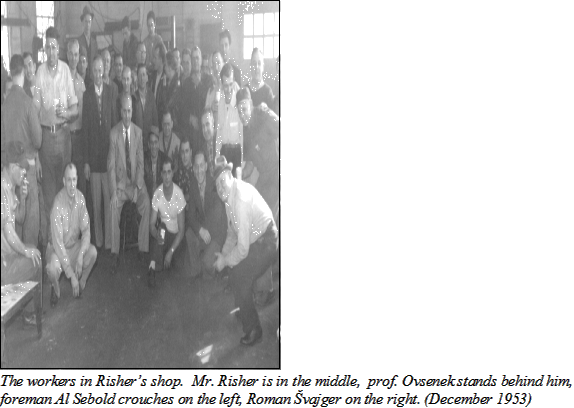 Blaz Vavpotic worked at the university
in Ljubljana as a chimney sweep - he joked that his job was higher than the
president's.
Blaz Vavpotic worked at the university
in Ljubljana as a chimney sweep - he joked that his job was higher than the
president's.
Tuesday, September 19,
1950
Partly due to my recruiting, we
now have 25 workers instead of the 8 when I started. One of my co-workers asked
me to stop recruiting; he's worried there won't be enough work left for the
rest of us.
Sunday, September 24,
1950
At 1:30 in the afternoon, the
day turned to night for about an hour. The sky was cloudy and the horizon was
beautiful like a sunset. Lights came on everywhere.
At 4:30 we attended a concert
of Slovenian, Croatian and American songs in the Slovenian National Home on St.
Clair. The hall was full and the singing was beautiful. Governor Lausche made a
speech.
Friday, September 29,
1950
Albin Klamer bought an old
Chrysler for $500 and drove me to work, even though he doesn't have his license
yet.
Earlier in the week, I had to
clean some parts in chlorine. I've had a headache ever since. I'm deathly
afraid of that chlorine - it's worse than the Gestapo.
Sunday, October 1, 1950
I had back pains last night and
couldn't fall asleep till early this morning. I was still sleeping when Cilka
went to the 8 a.m. Mass and left Johnny with me, as she usually did on Sundays.
Johnny, who is only 2, got out
of the house by himself and walked to St. Clair, wearing nothing but a shirt. A
man found him on the streetcar island in the middle of St. Clair. Somehow
Johnny had walked across the traffic to get there. It looked like he wanted to catch
a streetcar. Luckily, the man found out where we lived, and brought Johnny home
to me.
In the afternoon, we walked to
1058 E. 74th St. to visit a family from our home town in Slovenia. In an
amazing coincidence, their landlord turned out to be the man who had rescued
Johnny this morning.
Monday, October 2, 1950
This afternoon I went to see
Dr. Kern to determine whether I was healthy enough to get health insurance
through the Slovenska Dobrodelna Zveza (S.D.Z.) I am 5'7", weigh 140 lbs.,
and have too much sugar in my urine. The doctor asked me to come back tomorrow.
He also took some fluid out of a swollen elbow which I must have injured on the
job. The whole visit cost $2.
Tuesday, October 3,
1950
Dr. Kern determined my blood
sugar was acceptable: what a relief!
At work, the foreman suggested
I go thank Mr. Risher for giving me a raise of 10 cents an hour, but I couldn't
find the right English words. I'm making $1.40 an hour now, but paying twice as
much income tax as I did at Z&W.
Mrs. Jereb brought winter clothes for Johnny.
Sunday, October 8, 1950
The American Stamping Co.,
across the street from Rihtar's, is working night and day, and for the first
time today, on Sunday as well. Their noise makes it impossible to sleep and reminds
me of our trip to America as refugees on a military transport ship. We hit a
terrible storm in the Mediterranean. The ship was tossing so heavily that the
porcelain dishes came crashing down with such a noise that we thought we had
hit a mine.
Thursday, October 12,
1950
The pain in my elbow has made
work difficult. I saw Dr. Kern, who took out more fluid and again charged $2.
Saturday, October 14,
1950
A car hit 10-year old Frank
Rihtar and his brother Milan. We took them to the old Glenville Hospital on E.
106th St. Frank has a dangerous head injury and Milan has shoulder pains. The
police put the driver in jail.
Saturday, October 21,
1950
Four more Slovenians got jobs
at our shop: Balantic, Meglic, Skubic and Boh. The owners are building a
warehouse and starting three shifts. I received my paycheck: $128.50, plus a
3-month bonus of $23.68.
Monday, October 30,
1950
The Ameriška Domovina
says this was the hottest year in 80 years.
Wednesday, November 1,
1950
Our foreman, Al, has been
harassing me, the professor and the other Slovenians whenever he can. The
evening foreman, Joe Zlate, is much better.
Thursday, November 2,
1950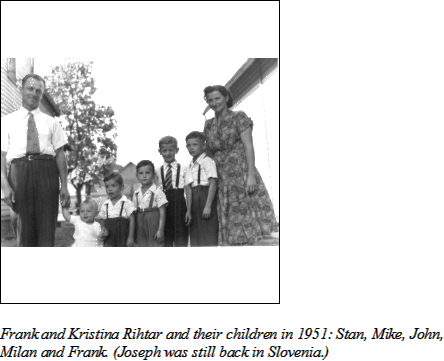
Al asked me to teach Frank
Bizjak how to use the machines. Frank got mad when Al tried to teach him.
Bizjak is studying to be an engineer and knows more than Al.
Thursday, November 9,
1950
I sent $45 to the League of
Catholic Slovenian Americans for food for poor people back in Slovenia. And I
sent $43 to the New York-Dalmatia group for two sacks of flour and two packages
for my mother.
Sunday, November 12,
1950
This afternoon we celebrated
the 40th anniversary of S.D.Z at the Slovenian National Home.
The Rihtar's celebrated the
baptism of their new son, Stan.
Tuesday, November 14,
1950
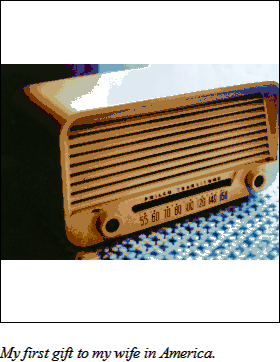 Al taught me and Bizjak how to read a
micrometer. He proudly pointed to the words Made in Germany. "Amerikaner
sind zu dumm um so etwas zu tun" ("Americans are too dumb to
make anything like this"), he said. But he was zu dumm to answer
the question, how many threads per inch does the micrometer need if one turn is
25/1000 of an inch? He boasts about being on the engineering faculty of Western
Reserve University, which he never was. If anything goes wrong for him, he
blames it on "my Slovenian wife."
Al taught me and Bizjak how to read a
micrometer. He proudly pointed to the words Made in Germany. "Amerikaner
sind zu dumm um so etwas zu tun" ("Americans are too dumb to
make anything like this"), he said. But he was zu dumm to answer
the question, how many threads per inch does the micrometer need if one turn is
25/1000 of an inch? He boasts about being on the engineering faculty of Western
Reserve University, which he never was. If anything goes wrong for him, he
blames it on "my Slovenian wife."
Wednesday, November 15,
1950
Another hour and a half of
instruction about micrometers and plans. The foreman has become suspiciously
friendly to me. He asked me to influence the other workers to not produce scrap.
My pay was increased again,
from $1.40 to $1.50.
A tall thin Hungarian sells
lunches at noon and works in our shop for 4 hours each evenings. He told me he
was an American "mosquito" pilot during the war. Mosquitoes were
small planes armed with bombs and heavy machine guns. He was shot down and
captured during an attack on the oil refinery at Ploesti. I showed him a
picture of a warplane attack on my hometown of Ziri. Bullets from a warplane's
machine gun ripped through the walls of my family's home, but luckily nobody
was hurt. He said it's possible he was the pilot of that warplane.
Wednesday, November 22,
1950
It's my wife Cilka's nameday.
She was 36 on November 4. (We usually have a person's nameday in the same month
as their birthday, and celebrate the nameday the way Americans celebrate a
birthday.)
I decided to look for a radio
for Cilka. Our friend Milica had recommended shopping at a store named
"Rola". I looked everywhere, but I couldn't find that store. Then I
went down E. 55th St. to Economic Furniture and finally found a Philco
for $21.63. I liked the Zenith with the alarm better, but at $43, it
seemed too expensive. I brought the Philco home, gave it to Cilka and
wished her a happy nameday. Both she and Johnny are very happy with it.
Thursday, November 23,
1950
It's Thanksgiving and no work
today. The workers had expected to receive turkeys at the shop, but we didn't
get any.
Saturday, November 25,
1950
We worked two shifts in a row -
from 2 p.m. yesterday until 5 a.m. this morning to make up for the Thanksgiving
holiday. Heavy snow. At 5 a.m., Mr. Red offered to drive all eleven Slovenians
to the streetcar stop, but his car was stuck in the snow. After some pushing,
we got it moving. Seven of us rode inside the car, and the rest sat on the
outside. We were lucky we took shovels, because we got stuck again and again.
Finally he dropped us off at the "Five Points" streetcar stop on E.
152nd St. We waited there in the blizzard in light clothing for 30 minutes,
freezing and shaking. When the streetcar finally came, it took an hour to get
to E. 63rd St. We were soaked through and chilled. There was a yard of snow on
the ground and many cars stalled on the road. (That streetcar we took home
turned out to be last one for a number of days.)
Sunday, November 26,
1950
I went to the 9 a.m. Mass and
saw only one car moving on the way. There were soldiers driving tanks on St.
Clair.
Sunday, December 3,
1950
It rained last night and melted
most of the snow, except for some large piles along St. Clair.
St. Nicholas came to the Rihtar's house this evening. The other children were very afraid, but the only time Johnny cried was when a devil tried to take me away. Johnny got two packages, including a car, a book and a piggy bank. He was very happy.
Thursday, December 14,
1950
I returned Machine Shop I
to the Public Library and took out Volume II.
At work I got a bonus of $39.20
(10 cents an hour for the last two months). They're promising another raise of
10 cents an hour, if President Truman doesn't freeze wages.
Tuesday, December 19,
1950
The handle on the drilling
machine hit me in the forehead and caused a bleeding wound.
Wednesday, December 20,
1950
I bought a pair of dress shoes
at Mandel's Shoes for $13, and then went to Sam's, where I
bought a little Christmas tree for $1.25 and 7 Christmas lights for $2.
Friday, December 22,
1950
There was a Christmas party in
the shop this morning, with whiskey, ginger ale and fish. Mr. Risher served
canned sardines on a large platter, probably a whole can for each worker. Some
of us tried them, but most didn't. Mr. Risher also handed out cigars, but only
Mr. Erdani smokes cigars. He asked each of us to take two cigars and give them
to him. Mr. Risher saw what was happening and finally just gave the whole box
to Mr. Erdani. We sang Slovenian songs and got turkeys.
In the evening, we set up our
Christmas tree with the 7 lights and a nativity scene without a stable. Johnny
couldn't stop having fun moving the nativity figures around.
Sunday, December 24,
1950
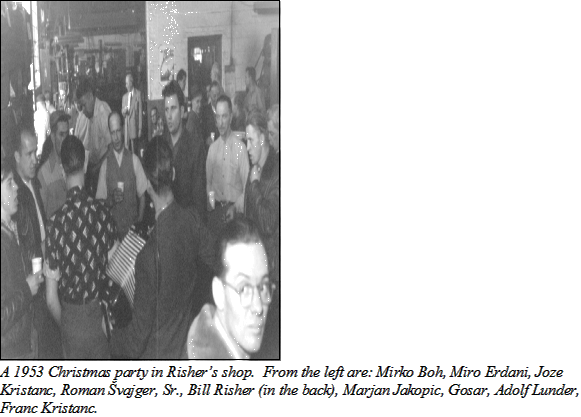
It's a year
since we arrived in America. It seems we wasted the first 6 months on the farm
in Wisconsin, but now we're starting to put down roots in our new homeland.
This morning, Cilka prepared
the turkey I got in the shop. It was our first time eating a turkey and it was
delicious! We also had soup, potatoes, lettuce, cherries, wine and potica.
Monday, December 25,
1950
Today is our second Christmas
in America. Last night I went to midnight Mass at St. Vitus. In the last 9
years, I've been to Christmas midnight Mass in 8 different churches. They were
all beautiful, but the best one was at home in Ziri.
Thursday, December 28,
1950
Ruth and Annie Jesenko brought
Christmas presents - a handkerchief, clock, crayons and coloring book for
Johnny, and wine, salami and jelly for Cilka and me.
Sunday, December 31,
1950
We had visitors from 2 - 11
p.m: Karel Erznoznik and his family, Rudi Drmota and Tone Zupancic. At midnight
I went to Mass. The sirens are wailing, firecrackers are bursting, and the new
year is coming ...
This year I earned $226.90 at
Z&W and $1,400.08 at Risher's.
1951
Tuesday, January 2,
1951
At Belaj's men's shop I bought
two shirts and sent them to my father back home. The postage cost as much as
the shirts.
Wednesday, January 3,
1951
Johnny had such vivid dreams
about a "kitty" that it took more than hour before we could convince
him we don't have one. He kept on seeing it everywhere.
Thursday, January 18,
1951
I started learning tapcutting
(cutting threads inside a drilled hole in metal) on a newer machine.
I have to wear rubber boots all
the time because the machine drips so much oil, it would ruin normal shoes.
(The oil keeps the drill bit from getting too hot as it cuts into the metal.)
Friday, January 19,
1951
My German foreman is angry
because I produced too much yesterday. Today he set my machine on Slow,
so I finished only 59 pieces, with 5 holes each.
Thursday, January 25,
1951
This morning, Cilka, Johnny and
I took the streetcar to the Cuyahoga County courthouse downtown, where we filed
our first citizenship papers. Then we went to 626 Huron R., where I filled out
my income tax return and learned that I will get a refund of $104.
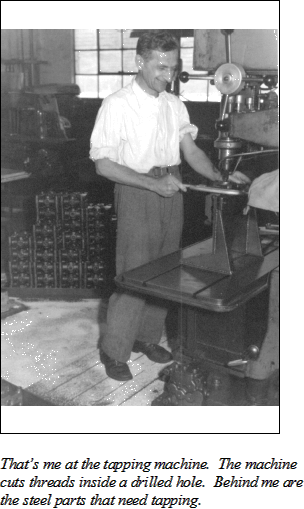 At the shop, both tapping machines are
running all day. We make some mistakes almost every day, but I don't produce
scrap (unusable pieces).
At the shop, both tapping machines are
running all day. We make some mistakes almost every day, but I don't produce
scrap (unusable pieces).
Sunday, January 28,
1951
Karl helped me bring home a
large, old, hand-winding Edison gramophone with a number of old records. Mr.
Belaj gave it to us because it was in the way.
Tuesday, January 30,
1951
Cilka went shopping today and
sold $20 of her homemade lace to the stores. But lace is generally not
appreciated here and is very hard to sell. Cilka told Mrs. Smrekar how little
she earned from her lacework. Mrs. Smrekar said, "If it's only a penny an
hour, it's better than nothing."
I saw a large tablecloth at the
market for $3. It was plastic, but it looked so good I could have mistaken it
for real lace.
Mr. Red stopped at my machine
and made friendly conversation for at least half an hour. Mr. Risher is
completely different: very dry and unapproachable. Once I stepped away from my
machine to clean a piece I had been working on. I said a few words to my
co-worker Albin Klamer. Mr. Risher came out from his office and said, "If
I ever see you talking with anybody, you'll get your last paycheck."
Friday, March 23, 1951
I deposited $100 in Mr.
Grdina's North American Bank, and sent $30 to my friend Tomaz Pivk for
the camera he bought for me in Austria.
Wednesday, April 11,
1951
We went to 1165 E. 58th St. We
had heard there was an apartment there for rent at $12 a month, but it was
already taken when we got there.
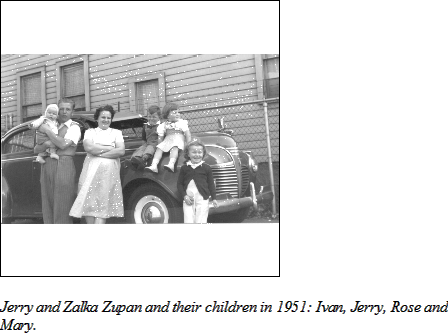 I was worried about Johnny's illness,
but today he seems healthy. His dreams must not mean anything.
I was worried about Johnny's illness,
but today he seems healthy. His dreams must not mean anything.
Friday, April 20, 1951
At Kollander's I ordered one
package of food to be sent to my father, and one to Cilka's mother.
Thursday, April 26,
1951
Because of the large number of
bad pieces being produced in the shop, each of us have been assigned our own
number, which we have to use to mark every piece we produce. Constantly more
harassment.
New York Central laid off 50 workers, Fisher Body
laid off 600. Our friend Milica is only working three days a week. We have less
work, too.
Sunday, April 29, 1951
We all went to church and then to the playground. In the evening we went with Rafko Zonta to see a Tarzan movie.
Saturday, May 12, 1951
For Mother's Day, I bought
Cilka a ladies' hat for $15.
Sunday, May 13, 1951
This afternoon we saw a play at
the Slovenian National Home. Bishop Gregory Rozman and Dr. Krek were also
there.
Thursday, May 17, 1951
Our friend Mrs. Rose Zupan gave
birth to a 10 pound baby boy.
My paycheck is only $116.48 for
14 days. We haven't worked on Saturdays for a few months. I wish we could work
more hours! About 10 of our workers have left for work elsewhere. I'll stay as
long as I can.
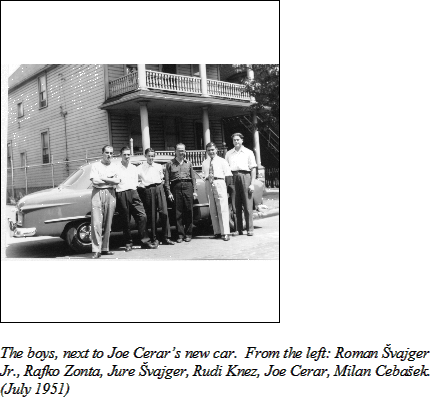 Saturday, May 26, 1951
Saturday, May 26, 1951
Joe Cerar bought a new Ford for
$1,100.
Wednesday, May 30,
1951, Memorial Day
The Erznoznik family joined us
for our first visit to Euclid Beach Park. We were there for 6 hours, and
enjoyed it.
Rihtar's 5-year old son John
fell off a roof and had a brain concussion. He sounds confused; they say he'll
need to rest for 6 weeks.
Saturday, June 2, 1951
We worked 8 hours in the shop
today, to make up for the Memorial Day holiday
Tuesday, June 12, 1951
Today at the shop I completed
600 heavy pieces on the tapping machine. That means I lifted about 80 heavy
steel parts per hour onto the machine, threaded the holes, and set them back
down on the floor. I'm tired.
Wednesday, June 13,
1951
It's my birthday. Cilka and
3-year old Johnny gave me a cake and a new shirt with a tie. Johnny didn't know
how to say anything other than "day" ("dan" in Slovenian).
He forgot everything else his mother taught him. For dinner, Cilka made soup,
potatoes, beans, veal cutlet, potica and wine.
Sunday, June 17, 1951
We went to Euclid Beach Park
with the Erznoznik's again. This time the Švajger family came with us, too.
In the evening, we had singing on the Rihtar's porch, including the Rihtar's, Švajger's and Zonta.
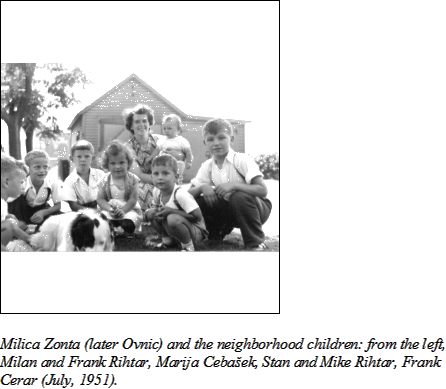 Thursday, July 19
Thursday, July 19
When we arrived in America, we
couldn't believe that the largest industrial power on earth still didn't have
universal insurance for health, accidents and death. This month it seemed we
had an opportunity to at least partially address this problem.
At the beginning of the month,
there was a poster in the shop, inviting people to apply for health insurance.
Mr. Risher said he would pay 50% of the cost of health insurance if more than
half of the workers applied by July 19th.
I collected signatures from
slightly more than half of the workers and took them to the office. But then
Mr. Risher said it had to be at least three-fourths, not half. In the following
days, I convinced more of the workers to sign up, until I had over
three-fourths. I took the new list of signatures to Mr. Risher just before July
19th, but then he said it was already too late.
So we have to wait for health
insurance for another year.
Sunday, July 22, 1951
In spite of the rain, I went
with Bozo Lorber to the outdoor Lourdes shrine on Euclid Avenue. Father Roman
Malavašic, who was with us in the refugee camp, celebrated the 10th anniversary
of his first Mass. There were about 60 people there who had been with us in the
Trofaiach camp.
Sunday, August 5, 1951
A nice cool day. Cilka, Johnny
and I took the streetcar and a trolleybus with the Erznoznik's to visit the
Jesenko's on W. 61st. We took pictures, watched TV and enjoyed their
hospitality. Jakob Jesenko drove us back home.
Wednesday, August 8,
1951
Today I worked for the first
time on the machine next to Professor Ovsenek's. It was such easy work that I
could have read a newspaper. All I had to do was set up a piece on the machine
every hour, and then the machine worked on the piece by itself. This is the
machine that is usually operated by Mr. Risher's brother, Homer, who doesn't always
come to work.
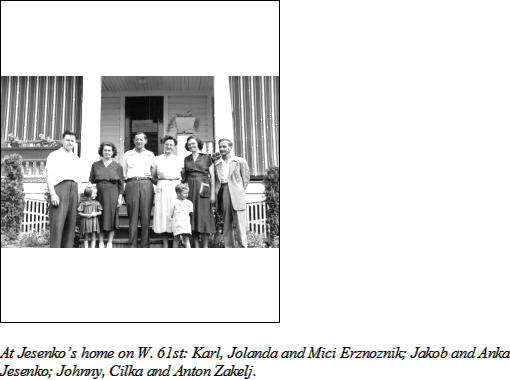
Prof. Ovsenek works on the
first machine next to the rear entrance to the shop. Mr. Risher comes through
these doors every day and walks through the whole shop to the office on the
other end. When Mr. Risher came in today, Prof. Ovsenek turned towards him,
bowed deeply and said, "I bow before you!" Except for a barely
visible smile, Mr. Risher didn't respond.
Saturday, August 11,
1951
Mr. Rihtar's mother, Mary, and
her daughters Mary and Paula moved out to their own place on E. 71st.
Sunday, August 12, 1951
We walked to Kirtland Park on
E. 49th. I tried finding a rowboat for rent on the lake, but without success.
Sunday, August 19, 1951
We went to the bazaar at St.
Vitus. They had dancing, alcohol, and gambling - all the things that were
strictly forbidden at our church back in Slovenia. Here, the end justifies the
means.
Tuesday, August 21,
1951
After the lunch break in the
shop (actually supper, since we were working the evening shift), the workers
played some volleyball outside. Paul Kaal, a former Cleveland Indian, is one of
our co-workers. He bought us a volleyball. I think he was disappointed in the quality
of our game.
Sunday, August 26, 1951
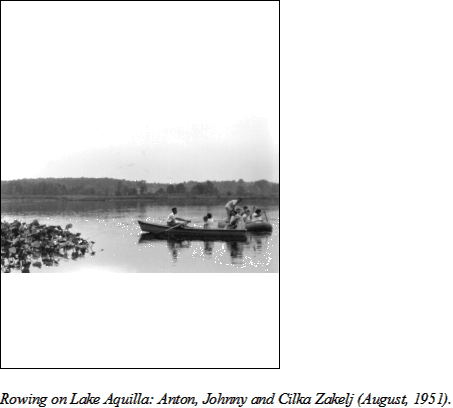 All the workers brought their families
to a shop picnic at Aquilla Lake, about 29 miles from here. Mr. Risher, Mr.
Red, the foremen and most of the workers were there. They treated us to bread
and sausage, cookies, wine, beer, coffee and other goodies. It was much better
than I had expected. We played ball games and rowed on the lake.
All the workers brought their families
to a shop picnic at Aquilla Lake, about 29 miles from here. Mr. Risher, Mr.
Red, the foremen and most of the workers were there. They treated us to bread
and sausage, cookies, wine, beer, coffee and other goodies. It was much better
than I had expected. We played ball games and rowed on the lake.
Friday, August 31, 1951
It's been terribly hot. I'm
constantly wet from sweat and machine oil. I'm not used to drinking much and am
not taking this heat well. I've completely lost my appetite. I can't eat at
work, and our attic apartment is like an oven, so I can't eat there either.
Sometimes I take food to Grdina playground and eat there. I don't know how long
I can take this.
One day this week, towards the
end of the day in the shop, I was feeling sick. I went to the bathroom to get
some cool water on my face and get my strength back. Mr. Risher came right
behind me and told me it wasn't time to clean up yet. I told him I was feeling
sick, and he said, "Keep working till we're done, and then go see a
doctor!"
I did go see a doctor, who said
I had weak blood. He gave me an injection of Vitamin B-12, which helped. The
doctor said I would need more injections, so he invited me to bring my wife on
my next visit, so he could show her how to do the injections. He said,
"Why should you pay me $4 twice a week, when your wife can do this much
cheaper?" (In fact, that did work out well.)
Saturday, September 1,
1951
It's Labor Day weekend. At 7
this morning, I went with Frank Bizjak and three other friends on a 3-day trip
to Canada. Bizjak just bought his first car and doesn't have a license yet.
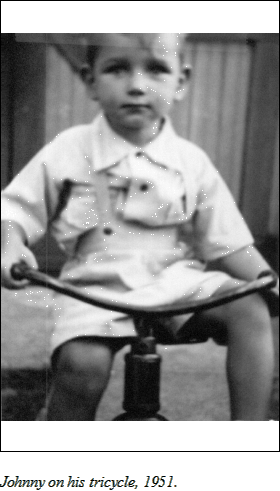 It was a long ride on poor, winding roads.
(There was no Interstate 90 at that time.) We reached the Canadian border and
Niagara Falls late in the afternoon. It was so foggy, we couldn't get a good
view of the falls. On the way, we saw many beautiful vineyards and peach
orchards.
It was a long ride on poor, winding roads.
(There was no Interstate 90 at that time.) We reached the Canadian border and
Niagara Falls late in the afternoon. It was so foggy, we couldn't get a good
view of the falls. On the way, we saw many beautiful vineyards and peach
orchards.
Twelve hours after we left
Cleveland, we reached Toronto. I've never seen so many automobiles.
We had trouble finding our way
in Toronto, but finally found Paul and Frank Kokelj at 284 Euclid. They took us
to Potocnik's, where we talked till midnight.
Sunday, September 2,
1951
We met many old friends at
church this morning. My friend Janko Demšar came from Manitoba, and my
brother-in-law Mike came from Hamilton. It's more than three years since we
said farewell to each other at the refugee camp. We thought we might never meet
again.
In the evening, Mike took us to
a concert and gymnastics exhibition for the new church. Mr. Grmek was the best
gymnast. The young ladies in Slovenian national costumes got the biggest
applause. After the exhibition, they had a dance. Then Mike took us to his
place in Hamilton, where I spent the night on his couch, after talking till 2
a.m.
Monday, September 3,
1951
Frank Bizjak drove us back
home. On the way, we stopped at Niagara Falls, where we saw a beautiful
rainbow. When we returned from the falls to Bizjak's car, we noticed that he
had locked the car and left the keys inside. We tried to force the car open
without success. A policeman noticed what we were doing and stopped to inquire.
Luckily he believed us (and didn't ask for a driver's license). He got a coat
hangar from his car and managed to get our car open.
We returned home late at night.
The doors were all locked and nobody was up. I tried opening a window to crawl
in, but a neighbor noticed and yelled at me, thinking I was a burglar. The
yelling woke up Mr. Rihtar, who opened the door for me.
My total cost for the 3-day
trip was $18, including $12.50 to Bizjak for the ride. I'm glad I went.
Thursday, September 6,
1951
Karel Erznoznik and Jerry Zupan
quit their jobs at Fisher Body. The pay is good, but the work is too
demanding. They got jobs at Hydraulic Equipment on E. 220th. Karel is
a janitor and makes $1.54 an hour. He works seven days a week, but isn't in
pain like he was at Fisher Body.
Tuesday, September 18,
1951
At Tanko's grocery store, I
received a free bed-sheet as a reward for reaching $200 in purchases.
Thursday, September 20,
1951
One of my younger co-workers,
Roman Švajger, started attending high school at Cathedral Latin. He thinks we
should buy a house together with Erznoznik's, but I don't think they can afford
it.
Monday, October 1, 1951
Cilka is pregnant. We went to
see Dr.Dejak O'Donnell.
Monday, October 15,
1951
I went to Komin's drugstore for
medicine for Cilka. The medicine will help prevent premature birth.
Thursday, October 18,
1951
After we got off work at
midnight, we went to Kozar's bar. There we celebrated till 2 a.m. with our
co-worker Štupnik, who is getting married this Saturday.
Monday, October 22,
1951
Mr. Red showed us a large
picture of his farm on Hickory Hill on Heath Road. He often stops to talk with
me, so I have to turn off my machine. He likes Slovenians, and invited us to
visit his farm.
Sunday, October 28,
1951
Bozo Lorber and I went to Mr.
Red's farm, about 12 miles east of Cleveland. The house is 114 years old, the
other buildings are falling apart, and the stable has manure which is about a
yard deep. Mr. Red is planning to clean and fix everything. He wants me and
Lorber to work there in the mornings and Saturdays, and continue working
evenings in the shop. He wants to build two dams across a creek and create a
pond to raise trout. Right now, the only exemplary part of the farm is the
woods. There are many oaks, maples, beech and hickory - worth $70,000,
according to Mr. Red.
Mr. Red told us about the Amish
people who live in the area. He said they never use electricity, since they
believe it was created by the devil and not natural. He had an Amish maid for a
while, and she only agreed to work for him if she didn't have to use any
electric appliances. He told us about Amish customs; for example, the night
before a wedding, they tie up the bride and groom in a sack and leave them in
there for the night.
Tuesday, October 30,
1951
In the evening at work, Mr. Red
invited me into his office, where we talked about his farm for an hour. He said
I could live on the farm and he would pay me $100 a month, if I would work 2 -
4 hours a day and all day Saturdays. I told him I can't do it now, since I
don't have a car.
Cilka said she would like to
live on a farm.
Monday, November 5,
1951
Trolley buses replaced the
streetcars on St. Clair. Thomas Burke was re-elected mayor for the fourth time.
In Nevada, they're testing new atomic bombs. Peace talks to end the Korean War
have been unsuccessful.
Tuesday, November 13,
1951
Mr. Risher asked the workers
what they prefer for Thanksgiving - turkey or ham?
Mr. Red attached a hydraulic
shovel to a 4-ton Caterpillar bulldozer to use on his farm.
Sunday, November 18,
1951
For the first time, I got some
work at Belaj's store for men's hats and clothes. I cleaned hundreds of boxes
of shirts and received $5.
Tuesday, November 20,
1951
Each day, before I go to the
evening shift at Risher's, I do some work at Belaj's store. I do odd jobs like
shoveling and sweeping snow off the sidewalk. Mr. Belaj told me to stop in
every day and see if there's anything that needs doing. He pays me $2 - $3 a
day.
At the shop, they gave me an
11-pound turkey.
Thursday, November 22,
1951, Thanksgiving
I gave Cilka a Slovenian
cookbook for her nameday. We had a Thanksgiving turkey dinner. After that, I
worked at Belaj's from 1 - 6 p.m., again cleaning boxes.
Thursday, December 6,
1951
St. Nicholas brought Johnny
some chocolates and socks.
Sunday, December 9,
1951
From 1 - 6 p.m., I decorated
the display window at Belaj's. Then we had a St. Nicholas celebration at
Milica's. First there was a play, then presents. Cilka got slippers, I got
socks, and Johnny got a hat, a car, a puzzle, candy, chocolates and more.
Thursday, December 13,
1951
At the shop, I received a
2-week paycheck with a 3-month bonus, net $170. Mr. Risher said no more reading
newspapers during break time.
Saturday, December 15,
1951
About 12 inches of snow fell. I
shoveled at Belaj's in the morning and again in the afternoon.
Thursday, December 20,
1951
We had more snow, then rain,
and tonight everything froze.
This morning, the writer, Karel
Mauser, came to Belaj's and said "Do you have something for the
rain?" Belaj said, "What do you mean? For the rain you need an
umbrella, for your head you need a hat." Karel replied, "Well, show
me what you have." To which Belaj said, "Tell me what size and color
you want!" Karel: "Oh, if only I knew." Belaj gave him a hat,
but then quickly pulled it back and put it on his own head, saying "This
is how to put a hat on your head! Anyone who doesn't know how to put on a hat
is not intelligent." They were mostly talking Slovenian, but Belaj used
the English word "intelligent" to show how smart he was. I was
listening quietly and trying hard to not break out laughing - here was the most
productive Slovenian writer outside Slovenia, and Belaj was trying to tell him
who was intelligent. I left them and went outside to shovel more snow.
Soon Karel came out, without
anything to protect him from the rain. He told me, "Make sure you don't
toil for that b.... for nothing."
Sunday, December 23,
1951
We had a Christmas party at the
shop. I had whiskey and 7-Up. We sang and listened to Blaz playing on the
accordion, and an Italian, Niko, who played three instruments at the same time.
I received a 16-pound turkey.
After that I took Cilka and
Johnny to watch Anton Grdina showing his pictures of Slovenia and the Holy
Land. Mrs. Tanko gave presents to the children.
Monday, December 24,
1951
I worked at Belaj's from 9 a.m
to 8 p.m, cleaning and selling. In the evening, we said one decade of the
rosary with the Rihtar's, and then two more in our apartment.
Saturday, December 29,
1951
Cilka went to see Dr. O'Donnell
again. The doctor said the baby will come very soon.
Sunday, December 30,
1951
This morning I took Johnny to
church, to see the nativity scene. In the afternoon I took care of little Stan
Rihtar and Mike Sršen, while the others went to watch a play at the Slovenian
National Home.
Monday, December 31,
1951
This evening, Rudy Drmota came
to pray the rosary with us. Then I worked till 11 p.m. to close out our family
bookkeeping for the year.
My income for 1951: $3,638.72
at Risher's and $111.50 at Belaj's, total $3,750.22. Out of that, I paid
$311.40 for income tax, $54 for Social Security and $19.40 for supplemental
tax.
This has been a successful
year. We were all healthy and working. We managed to save about half of this
year's income, so we have $1,600 saved in the bank, and another $200 at home. .
We live frugally: we buy day-old bread at half price and eat the kind of food
we were used to back in Slovenia. Our lives have been focused on one goal - to
save enough for our own home.
Mr. Rihtar has mentioned that
he could get much more if he could rent our apartment to a bachelor. I don't
blame him for thinking that. I know it must be hard to put up with us. We have
lots of visitors. We are all constantly walking through their kitchen to get to
our apartment. Cilka has been urging me to find more permanent housing.
Whenever I hear about an apartment for rent, I go there immediately. But when I
tell them we have a small child, the apartment is no longer available. When I
go to work, I pass a little wooden house on St. Clair and 80th St, and I wish
that could be our home. When I told a co-worker at the shop about our problems
in finding housing, he said "Shame!"
Through all this, we haven't
forgotten about our families back in Slovenia. We still send them frequent
packages, but it seems the better our lives become, the less we think about
them. I'm getting to an age where I may have difficulty being hired by an
American employer and I do have to worry about my own family first.
1952
Tuesday, January 1,
1952
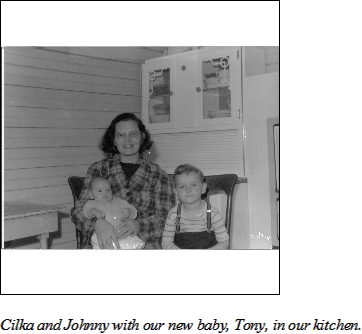 The new year began with sirens wailing
for 10 minutes. For me the new year started with rheumatism and hemorrhoids.
The new year began with sirens wailing
for 10 minutes. For me the new year started with rheumatism and hemorrhoids.
Wednesday, January 2,
1952
When I returned home at
midnight from working the evening shift, Cilka told me she had lost a lot of
water. We had to get to the hospital quickly! We don't have a telephone, so I
tried to wake our neighbor, but couldn't get any response. Finally I found a
phone at a nearby bar. I reached Dr. O'Donnell and then called a taxi. We
waited a long half hour for the taxi.
We reached St. Alexis hospital
at 1 a.m. Cilka was admitted immediately, but I had to return home to take care
of Johnny. When the taxi dropped me off, I didn't have the $2.85 change for the
cab fare, so I had to go to the Drina Bar near the St. Clair Recreation Center
to change a $20. A policeman there was very suspicious - why would a person
come into a bar at 1:30 a.m. to change a $20 bill?
Thursday, January 3,
1952
Our neighbor, Milica, received
a phone call from the hospital - Cilka had a baby boy! At 9 a.m. I took the
trolleybus to the hospital. When I got there, they let me look at my new son
through a window - he's a very healthy 8 lbs., 6 oz. and 21 ˝ inches long.
Fifteen minutes later I saw Cilka in room 437. She's also feeling well, thank
God!
Cilka gave birth at 4:15 a.m.
She wants our new son to be Tony.
When I returned home at 11 a.m,
I immediately wrote a letter to my father with the news of our new son. (His
name is also Anton.)
At noon, I tried cooking
potatoes and blood sausage for lunch, but neither one turned out well. The
potatoes were too hard and the blood sausage was burned. At 2 p.m., I took
Johnny to Erznoznik's, and I went to work. Earlier, we made plans that the
Gosar's would take care of Johnny while Cilka was in the hospital. But
everything's happened sooner than we planned, so we need to take him to
Erznoznik's instead.
I returned home from work just
before midnight and picked up Johnny at Erznoznik's. Mici Erznoznik gave me a
warmed-up bottle of milk, which I put in my pocket. At home, Johnny wouldn't
stop crying, no matter how much I rocked him. I got so frustrated, I hit him
and set him down in bed. He finally tired out and fell asleep. The next
morning, I found the bottle of milk in my coat pocket. I made a resolution to
never hit a child again. (I think I kept that resolution. Some years later,
somebody asked Johnny if he ever gets a spanking. He said, "Ata doesn't
know how, but Mama does sometimes." )
Friday, January 4, 1952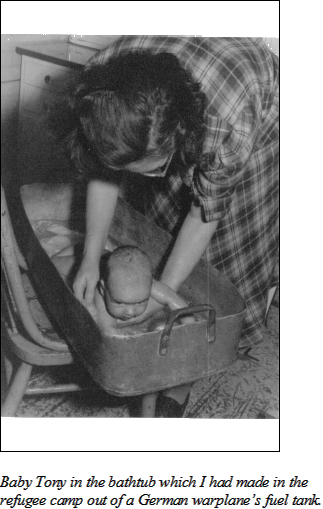
I worked at Belaj's store this
morning. Mr. Belaj said I'll be able to work there all year 3 hours a day. Mrs.
Belaj asked about Cilka.
After my unsuccessful cooking
on Cilka's first day in the hospital, I ate lunch with the Rihtar's. Mrs.
Rihtar is an excellent cook!
Saturday, January 5,
1952
I worked at Belaj's again this
morning. I argued with him and his assistant about my priest brother. They said
my brother doesn't care about me because he's owned by the Vatican. I said even
a stupid blockhead wouldn't believe something like that.
I told Belaj that I would be
visiting Cilka in the hospital tomorrow (Sunday) and that I would not be able
to work every day next week, since I will need to help Cilka after she returns
home. He replied, "First you need to make a living, then comes your wife."
I said, "No! I make enough for a decent living. Right now, my wife's
health has to come first."
In the afternoon, I worked in
the shop to make up for the New Year's holiday.
Sunday, January 6, 1952
I went to visit Cilka in the
hospital. She and Tony are both doing well.
Monday, January 7, 1952
This morning, I talked with Dr.
O'Donnell on the phone. Soon after, Albin Klamer brought Cilka home from the
hospital with our new American. Dr. O'Donnell was displeased that I wouldn't
allow circumcision for Tony. That's a Jewish tradition!
Tuesday, January 8,
1952
I slept poorly. Tony cried from
2 - 5 a.m.
Wednesday, January 9,
1952
I went to Belaj's, but he didn't have any work
for me.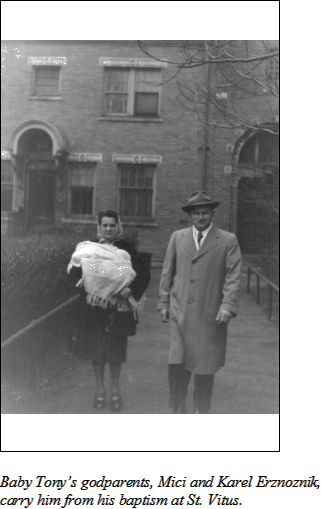
Saturday, January 12,
1952
Albin brought a little bed from
Sršen's for Tony.
I filled out the required
immigration reporting cards for us, Sršen's, Rihtar's, and Erznoznik's. The
Displaced Persons Commission requires all immigrants to report twice a year for
two years.
At Kollander's, I paid $15
postage for three packages of old clothes for my brothers Joseph and Ciril, and
for Cilka's brother Rupe. I also paid Kollander to make out checks for our
bills at St. Alexis: $15 for anesthesia and $104 for 5 days in the hospital.
Sunday, January 13,
1952
This afternoon, Albin drove
baby Tony and his godparents, Karl and Mici Erznoznik, to St. Vitus for
baptism. Then we went home and celebrated with wine, potica and coffee.
Wednesday, January 16,
1952
Again no work for me at
Belaj's. And at the shop, we're running low on orders. What if I lose both
jobs?
Thursday, January 17,
1952
I worked for 3 hours at
Belaj's, probably the last time. He didn't ask me about coming to work on
Sunday. He gave me a W-2, but it was the wrong form, and I noticed that he
reported more than he actually paid me. Because of that, I went into a higher
tax bracket and netted only about 70 cents an hour from the dollar he paid.
When he has work for me, he gives me the heaviest and dirtiest jobs, and I have
to listen to his propaganda. This isn't worth it.
At the shop, Mr. Risher said
non-citizens are not allowed into the part of the shop that's working on
airplane parts. It's all top secret.
Sunday, January 20,
1952
Frank Mlinar visited us,
bringing wine and chocolates. For the second time, he decided he 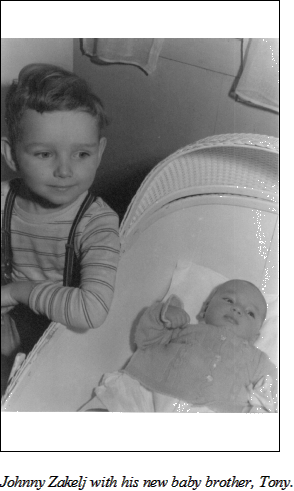 wouldn't marry Frances, but she changed
his mind both times. I told him you only need two things for a good marriage --
love and health, not house or money.
wouldn't marry Frances, but she changed
his mind both times. I told him you only need two things for a good marriage --
love and health, not house or money.
Wednesday, January 23,
1952
Belaj gave me the right W-2
form and asked me to come clean the store on Sunday. I told him I could come on
Saturday, but not on Sunday. He said he was very disappointed in me: "A
person shouldn't rest, even on Christmas!" To which I replied, "I
rest on holidays. Good-bye!"
I'm not going to let Belaj tear
me away from my family and my church, and instead tie me to the Dollar. He
likes to boast that he started with nothing, and now he has a beautiful store
and inventory worth $40,000. But he's not happy in his life. His wife has
diabetes and has lost both her legs. His only daughter married an Irishman that
he (Belaj) didn't like. Every year, there was a robbery at the store. Just
before I started working with Belaj, someone hit him on the head with a pipe
and robbed him. They found him on the floor, unconscious. That's part of why he
always wants someone working with him.
Thursday, January 24,
1952
Many of the other workers at
the shop are finding jobs elsewhere.
Baby Tony doesn't cry at night
any more, like he did the first three weeks. He's better during the day, too.
Tuesday, January 29,
1952
This morning, Ernest Zupan and
I went to the tax office downtown to file our tax papers. Everything went fine.
I paid 8.2% in taxes for my job at Risher's and 25.5% for the work at Belaj's.
At the courthouse, I translated and helped Zupan with his first citizenship
papers.
Wednesday, February 13,
1952
Mr. Red, the shop's co-owner,
is only interested in his farm. He's very nice to me and still wants me to come
work with him. I told him I can't, because I don't have a car and I don't plan
to buy one. He understands.
Saturday, February 23,
1952
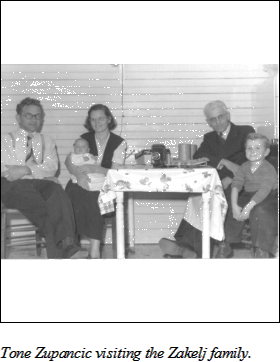 I received a health insurance check for
$50 for Cilka's hospitalization. When I paid for the insurance last summer, the
agent said it would cover all hospital costs. Later I noticed that the policy
said "up to $50 per hospital stay."
I received a health insurance check for
$50 for Cilka's hospitalization. When I paid for the insurance last summer, the
agent said it would cover all hospital costs. Later I noticed that the policy
said "up to $50 per hospital stay."
Monday, February 25,
1952
Back home in Slovenia, they
have over 6 feet of snow, the most in 100 years. Many roofs caved in and people
are not allowed in churches, because it's too dangerous.
Cilka had a dream last night
with many snakes, but she says I killed them all. A good sign!
Saturday, March 1, 1952
I went to a funeral Mass for
Karl Bukošek, the first of our group of refugees to die here. He's survived by
his wife, 3 daughters here, a daughter in Austria and another daughter in
Australia.
Thursday, March 6, 1952
Jaka Debevec, the publisher of Ameriška
Domovina, died at 9:30 a.m.
Saturday, March 8, 1952
Johnny and I went to the A&P
for groceries in the morning. After that we went to look at the trains, and
then to visit Jerry Zupan, who recently lost two toes.
Sunday, March 30, 1952
At the 10 a.m. Mass this
morning, Father Godina announced in a tearful voice that our pastor, Father
Ponikvar, died last night.
Our friend, Tone Zupancic,
visited us in the evening. Tone deserves a few more words here: He was born in
a poor, large family in Trebnje, a Slovenian town not far from my home town of
Ziri. When he was about 13 or 14, he got his wish to leave home and learn to be
a shoemaker. But after a few months, he had to return home, because there was
nobody to work the small family farm. In spite of all his other work, he
continued to learn shoemaking on his own, and he became better at it than if he
had apprenticed with a master shoemaker. When he applied for the required
trades permission, he had problems because he couldn't show the proper
apprentice training. They made an exception for him and let him take the exam,
which he completed with distinction. Later they named him to the commission
which administered the test for master shoemakers. We had a number of master
shoemakers in Ziri (my father was among them), and I can gladly acknowledge
that Tone was better at making dress shoes than any of them. He knew how to
make a shoe that fit your foot and was both comfortable and durable.
Wednesday, April 2,
1952
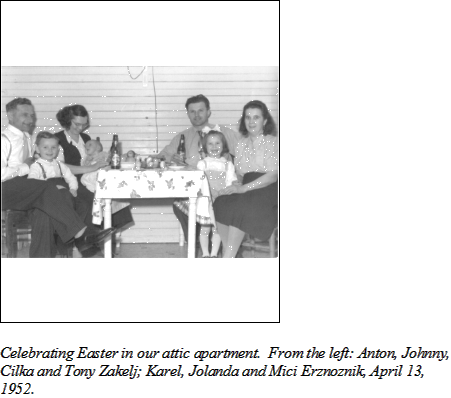 This morning we went to St. Vitus for
Father Ponikvar's funeral. In addition to Archbishop Edward Hoban, there were
20 monsignors and 100 priests. The church was completely full.
This morning we went to St. Vitus for
Father Ponikvar's funeral. In addition to Archbishop Edward Hoban, there were
20 monsignors and 100 priests. The church was completely full.
Sunday, April 13, 1952
I colored a dozen Easter eggs.
Cilka and Johnny took them to the 2 p.m. blessing at St. Vitus. We
learned that Father Baznik will be our new pastor.
Thursday, April 24,
1952
I went to see Dr. Meršol
regarding the constant headaches I've been having. He gave me an injection to
calm my nerves. It helped.
Thursday, May 1, 1952
I got a 2-week check for $146 -
25% more than before. I think I'll continue working at Risher's.
Thursday, May 22, 1952
Today is the holy day of the
Ascension. Our new pastor, Father Baznik, is an excellent singer and preacher.
In the evening, we worked at
the shop as usual.
Friday, June 13, 1952
It's my 45th birthday. Cilka and Johnny gave me ice cream and candy.
Monday, June 16, 1952
It's 102°F in our apartment and 95°F in the shop. They say it was the hottest
day ever in the U.S.A. I drink anything I can get.
Tuesday, June 17, 1952
In the last three days, I've lost almost 7 pounds because of the heat. I'm
working hard and taking liquids, but I can't eat.
Thursday, June 19, 1952
The weather has cooled somewhat, with a little rain.
Mrs. Rihtar had a baby girl - their first after 7 boys.
Wednesday, June 25, 1952
More temperatures in the high 90's. Whatever I do, I can't sleep. I'm
exhausted.
Thursday, June 26, 1952
I went to see Dr. Meršol. He said a nerve in my spine is pinched between two
bones. He gave me an injection and prescribed a medication. I still felt
exhausted.
In the afternoon, I missed work for the first time in America. It was 104°F
in our apartment. I went to Erznoznik's and slept in their basement. I woke up
soaked with sweat.
Tuesday, July 1, 1952
It's a little cooler and I'm feeling better. This morning, we (my family)
all took the bus to E. 93rd, where we bought a new baby carriage for Tony. We
walked it back home.
Friday, July 4, 1952
This morning I left for a 3-day church retreat in Lemont, Illinois. I took a
train to Chicago, then a bus to Lemont. Chicago is black from soot, as if it
had been bombed. Lemont has hills and trees, and mosquitoes.
Saturday, July 5, 1952
The weather is cold in Lemont. This morning we went to two Masses before
breakfast, then another Mass and singing.
In the evening, they gave us each a bottle of beer with our supper. Then we
had prayers, and a candlelight procession to the Lourdes grotto. Father Odilo
led the procession from a car with a megaphone. He spoke earlier in the day,
too, constantly reminding us to give more and work more.
I saw many old friends. We talked about what happened in the war in
Slovenia.
Sunday, July 6, 1952
We went to Mass before breakfast, then a procession and another Mass. Bishop
Rozman gave the sermon. In the afternoon, more conversation with old friends.
In the evening, I took the bus back to
Chicago, where the Republicans are holding their national electoral
conference. There are pamphlets everywhere: I like Ike!
Monday, July 7, 1952
The train from Chicago arrived in Cleveland at 8 a.m. Here's it's hot again.
The trip cost me $34.
Friday, July 11, 1952
I took Tony to the Baker Health Center on E. 55th for his first vaccination.
He weighs 16 lbs. The doctor said he needs to eat more soups and mashed food.
Saturday, July 12, 1952
Both Tony and Cilka slept poorly. Yesterday was 94°F, today 99°F.
The Republicans in Chicago elected General Eisenhower to be their
presidential candidate, and Richard Nixon for vice-president.
Sunday, July 13, 1952
This afternoon we went to the Lourdes grotto on Euclid Ave. for litanies, a
procession and sermon by Father Malavašic. Almost all of our friends from the
Trofaiach refugee camp were there. Afterwards we went to a picnic at Povirk's.
Sunday, July 20, 1952
We've had more very hot days. It's been 100°F in our apartment both of the last
two days.
Late today, we heard that Joe Cerar drowned in Lake Aquilla, where we had
the shop picnic last year. He and Tone Peternel were playing around in a
rowboat. Joe slipped into the water, held onto the boat for a while, but then
let go, as if to swim, but he didn't know how. I hear that Tone didn't even
notice when Joe went under the water. When they started looking for him, he was
gone. It's a small lake, but quite deep. They searched everywhere, but couldn't
find him.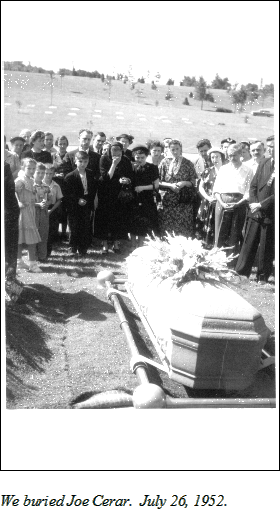
Joe was almost 20 years old. He
had been called to the draft for Korea, but I heard that he pretended a
disability and was not accepted.
Wednesday, July 23,
1952
This morning I went to the W.
Thomas Ford dealership to help the Cerar family straighten out Joe's affairs.
The dealer had made him buy $1,600 of life insurance when he bought the car.
Now the insurance paid the rest of what he owed for the car.
Thursday, July 24, 1952
The temperature in our
apartment dropped to 94°F today. I've started going swimming at the St. Clair
Recreation Center every day. That helps.
Joe Cerar's body floated to the
surface of Lake Aquilla today, four days after he drowned.
Saturday, July 26, 1952
At 9 a.m. I went to the funeral
Mass for Joe Cerar.
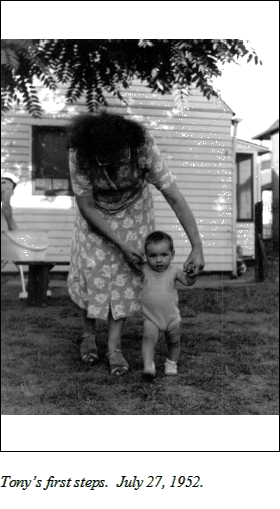 Again the temperature in our apartment
got to 100°F.
Again the temperature in our apartment
got to 100°F.
Monday, July 28, 1952
Mr. Risher asked me to start
working the day shift today. At 8 a.m., I was so tired that I considered
quitting, but I resolved to keep working till my last ounce of strength. I
actually started feeling better. Everybody else was working, so I couldn't
rest.
Mr. Risher fired Karl Janez,
the man who had first brought me to this shop. Now, out of all the newer
workers, I've been here the longest.
Thursday, July 31, 1952
I finally had a good sleep - better than I've had in a long time. The hot
weather lasted 6 weeks until it finally cooled off.
Monday, August 4, 1952
I went to look at a house for sale on 1259 E. 61st. They want $9,500. It's a
nice house, but not practical for us and Erznoznik's.
Wednesday, August 6, 1952
We had a large gathering to say good-bye to our neighbor, Rafko Zonta
(Milica's brother), who's being drafted for Korea. The Rihtar's, Sršen's, Cerar's,
Erznoznik's and others were there. Rafko was saying farewell as if he thought
he would never come back. (In fact, he died in an Army tank a year later,
just before the war ended.)
Thursday, August 21, 1952
I've been taking Johnny and Tony to the playground every evening. It's been
cool outside in the evenings, while it's still 90°F in our apartment.
Sunday, August 24, 1952
Johnny and I took the bus to W. 14th to pick elderberries. Someone was
watching us, so we stopped and went to the Zoo.
Friday, August 29, 1952
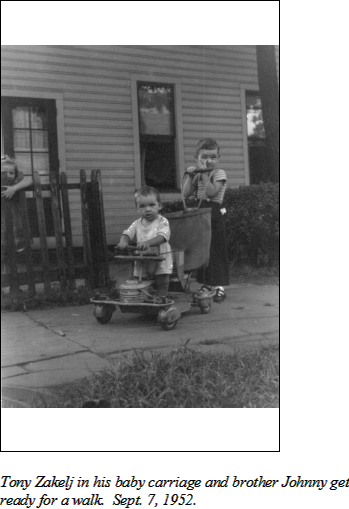 Today
was Johnny's fourth nameday. We gave him chocolate, cookies and ginger ale. He
was happy all day.
Today
was Johnny's fourth nameday. We gave him chocolate, cookies and ginger ale. He
was happy all day.
Wednesday, September 17, 1952
Mr. Risher asked me to find two workers for him. Two years ago, I found 20
workers for him, but I didn't get any more pay or less work from that.
Saturday, September 20, 1952
Tone Zupancic visited. The factory where he works is paying him only $1.35
an hour after two years. I invited him to come work with us.
Sunday, September 28, 1952
We walked to Gordon Park to look at the construction for the new freeway and
new bridges. They cut a spruce woods and moved an enormous amount of dirt. Now
there are hills where there were valleys, and vice versa.
Wednesday, October 1, 1952
I started taking an evening course in English at the school on Edison Ave. It looks like the teacher, Ben Levin, will be a good one. There are about 30 of us in the class. We have to pay close attention.
Wednesday, October 8, 1952
I had an argument with foreman Sebold, who then gave me two assistants and
told me to work slower.
Mrs. John Kolenc brought some toys for Johnny.
Friday, October 10, 1952
Mrs. Kolenc says her husband, John, died Wednesday, half an hour after she returned
home from visiting us. He came to America in 1905 and was 65 years old, with 7
children. One daughter is flying in from Florida, and a number of friends are
coming from Detroit.
We went to Grdina's funeral parlor in the evening. The Slovenian singing group, Triglav, sang "Springtime will return" for John Kolenc.
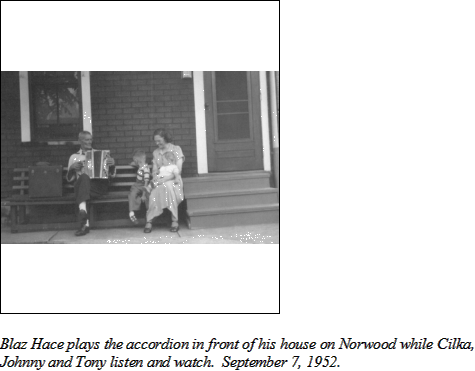 Tuesday,
October 14, 1952
Tuesday,
October 14, 1952
I've had a headache and toothache for over a week. I only have one of my own
teeth left. I went to see Dr. Opaskar, who wanted to pull the tooth, but I wouldn't
let him. Instead, he drilled and filled the cavity. It was very painful.
Sunday, October 19, 1952
We visited Mary and Blaz Hace at their home on Norwood. We gave Mary
chocolates and candy for her 72nd birthday. They always give us toys and help in
any way they can.
Johnny and I went for a walk along Lake Shore Blvd. from 55th to 82nd. The
new freeway through Gordon Park is almost done.
Monday, October 20, 1952
The filling came out of my tooth, so I went to Dr. Opaskar again.
Monday, October 27, 1952
Instead of going to English class, I wrote a letter to Frank Lamovec in
Wisconsin. They moved us to a larger class and gave us a new teacher. We don't
like her.
Monday, November 3, 1952
Our first English teacher is inviting us back, but nobody wants to go back.
Thursday, November 6, 1952
General Dwight Eisenhower got 33 million votes and won a surprise victory in
the presidential election over Governor Adlai Stevenson. The workers at the
shop are worried that we may soon have less work.
In Ohio, the Republicans had large victories, except in the governor's race,
where our Slovenian, Democratic governor, Frank Lausche, received 400,000 more
votes than his opponent Charles Taft. Lausche is the first Ohio governor to be
reelected four times.
Friday, November 7, 1952
We don't have much work in the shop, but Mr. Risher again asked me to help
find him two new workers. I'm not very interested in getting more competition
for myself and the other workers.
Thursday, November 13, 1952
I got my paycheck and immediately spent $40 for food packages for my father,
my brother and Cilka's mother. I also spent $9 to buy books for us.
Sunday, November 16, 1952
I went to the Slovenian National Home for the 60th anniversary of the
Catholic Congress in Ljubljana. Anton Grdina showed movies from his travels in
Jugoslavia, Austria and Italy.
Monday, November 17, 1952
Hydrico says we didn't thread the holes deep enough in the pieces our shop
did for them. We have to re-do a large number of parts.
Frank Ferkulj has been driving a group of us to work. Today we drove over
the new bridges at Gordon Park for the first time.
Saturday, November 22, 1952
For Cilka's nameday, I bought a "Meat and Food Chopper" at
Smrekar's Hardware. Mici Erznoznik brought a beautiful cake.
Monday, November 24, 1952
I'm tired from all the re-work at the shop.
My brothers Ciril and Vlado wrote, thanking me for the packages I sent.
The Švajger's bought a television for $600.
Tuesday, November 25, 1952
The foreman blames me for all our mistakes, even if it's not my fault.
The shop gave me a 15 pound turkey for Thanksgiving.
I went to English class, but we didn't study English. They had a party for
all the classes. We got donuts and cider.
Friday, November 28, 1952
Mr. Rihtar successfully completed the driving test in Willowick. I went
along to help him with the English.
Saturday, November 29, 1952
I had such a painful headache, I went to see Dr. Meršol. He gave me an
injection for my nerves and medicine for my ears. He said my nerves are sick
because of the humidity.
Tuesday, December 2, 1952
I went to work, even though my face was swollen from a toothache. After
work, I went to Dr. Opaskar, who pulled my last tooth. He gave me a shot so it
didn't hurt.
Wednesday, December 3, 1952
My brother Ciril sent four picture books for the children and a beautifully
bound book of Anton Aškerc poems for me.
Saturday, December 6, 1952
St. Nicholas brought me new pants. Cilka got cloth for two aprons and Johnny
got a toy garage with lots of cars. He was so happy, he said he didn't need
anything more for Christmas.
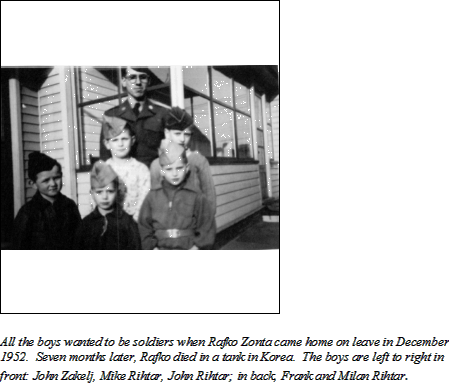 I
went to see Dr. Meršol again for my headaches. He gave me another shot.
I
went to see Dr. Meršol again for my headaches. He gave me another shot.
Friday, December 12, 1952
At the shop, the majority of workers decided we would work every day till
Christmas, so we can get two days off for Christmas.
In the evening, our family went to a Christmas party presented by the S.D.Z.
There was a lot of singing and accordion playing. Santa brought every child a
box of toys, candy and popcorn. Johnny and Tony were happy and didn't fall
asleep till 11.
Monday, December 22, 1952
I received 8 letters from Slovenia, including the first letter in more than
4 years from my priest brother, Stanko. He's finally free after being
imprisoned for more than 5 years in forced labor camps. His letter doesn't say
much, because all letters are open to Jugoslav censors. Saying the wrong thing
in a letter can get you more years in prison. (I learned later that the
official charges against him were never very clear - his real crime was to not
cooperate with the communists. Before the forced labor camps, they put him in
strict confinement for a year. Something like that could have happened to me if
I had stayed in Slovenia. )
I took Johnny to a Christmas party at St. Clair Recreation Center. About 600
children were there. Johnny got a tangerine, some popcorn and two cookies. It
was all worth about 15 cents. He was happy.
Tuesday, December 23, 1952
The shop gave me a bonus of $56 and a 19 pound turkey.
Wednesday, December 24, 1952
We worked from 7 a.m. to noon and then had our shop Christmas party. I had
whiskey and ginger ale. It was good, but strong!
At home, we set up a Nativity scene and a Christmas tree. In the evening, we said the rosary till 8 p.m. Then we listened to the radio till 11:45, when we went to midnight Mass.
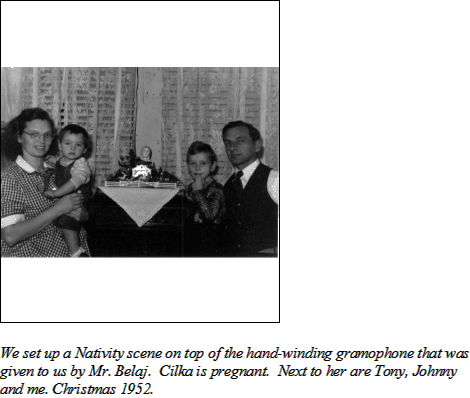 Thursday,
December 25, 1952
Thursday,
December 25, 1952
It's our fourth Christmas in America. I stayed in bed with the children till
9:30. Then I went to church in my new blue suit.
Friday, December 26, 1952
I sent 4 packages of food and clothing to my father, Cilka's mother, and my
brothers. They still have shortages in Slovenia.
Sunday, December 28, 1952
Jakob and Ana Jesenko visited and brought toys for the kids. Karl Erznoznik
came with them. He's been working extra, including Sundays, for the past 5
months.
Tuesday, December 30, 1952
I weigh 135 pounds, 10 more than 5 months ago.
Wednesday, December 31, 1952
Rudy Drmota came to say the rosary with us for New Year's Eve.
I'm satisfied with this past year. I earned $4,152.77, including taxes of
$299.60. We lived well and still saved $1,600. I only wish my health were
better. I spent $20 per month on medical costs, compared to the $5 per month I
had budgeted. I don't regret that I stopped working for Belaj's and that I
didn't go to work on Mr. Red's farm.
1953
Saturday, January 3, 1953
It's Tony's first birthday. He's very lively and unafraid. He's already
walking and likes to play.
Sunday, January 4, 1953
I worked on Address Report Cards,
the required immigration reporting cards for us and a number of other families.
I had picked up 60 cards at the post office for 10 families.
Sunday, January 11, 1953
Milica had lunch with us. The Army has moved her brother Rafko from Seattle
to Japan.
In the evening I went to a meeting of the Slovenian Catholic Academic
Elders. There were 50 - 60 people there. Monsignor Škrbec and Prof. Ovsenek
talked about labor unions and Social Security.
This week, we bought a new Electrolux vacuum cleaner for $118. Cilka and I
had a small argument when I said we can't have nice furniture with the kids
around.
Saturday, January 31, 1953
Mr. Rihtar said we will need to move out in two months, to make room for his
mother and his sister.
Sunday, February 1, 1953
This afternoon I filled out tax forms for Erznoznik's, both Švajger's, and
Milica.
Karl Erznoznik bought a new TV for $300. It has nice pictures, but I don't
care for TV.
Wednesday, February 4, 1953
We looked at a house for sale on Hecker Ave. It's too small and too
expensive: about $12,000.
Saturday, February 7, 1953
I took wedding pictures at Staric's this afternoon. They asked me to come
back tonight to take more pictures, when they have dancing and food. I did, and
took 8 pictures of the bride and groom at midnight.
Friday, February 13, 1953
I looked at a house for sale on Stanard. It's big, but not in good
condition, so it's only $8,800.
In the evening, I took Johnny to the movies for his first time. We thought
they were going to show "The Miracle of Fatima," but instead they had
"John Philip Sousa."
Monday, February 16, 1953
We've looked at a number of houses, but haven't seen one that would be right
for us.
Cilka is pregnant. She went to see Dr. O'Donnell for the second time today.
Friday, February 20, 1953
We tried the movie theater again. This time they showed "The Miracle of
Fatima." It was very beautiful. The theater was full of people.
Saturday, February 21, 1953
This evening Bishop Rozman spoke at St. Vitus school about the separation of
church and state. About 70 people attended.
Monday, February 23, 1953
I heard there was a house for sale on E. 64th. I went there and talked with
the owner. When he learned I was a refugee, he suddenly told me to leave. He
accused me of collaborating with Hitler said he would rather set fire to the
house than sell it to someone like me. Like so many other Americans, he doesn't
understand what happened in the war in Slovenia.
I learned later that the house would not have been much worse if it had
burned down. It's in bad condition and doesn't have a basement.
Staric ordered 85 copies of the wedding pictures I took.
Friday, February 27, 1953
Many people are sick with the flu.
Mr. Red sold his share of the shop to Mr. Risher. We expect things will get
worse. Mr. Red likes Slovenians because he knows we're the best workers. Mr.
Red knows how to work on the machines himself, but Risher doesn't know how. The
foreman told me, "Risher has the money, but Red has the brains."
Saturday, February 28, 1953
Mr. Risher called a meeting in the shop. He announced that he is now the
sole owner and that nothing will change.
Sunday, March 1, 1953
We looked for houses with the Erznoznik's and Milica. We might buy one
together. We didn't see anything that would be right.
Monday, March 2, 1953
Johnny and Tony both have the flu. They have a fever, can't sleep and throw
up whatever they eat.
Wednesday, March 4, 1953
Cilka started feeling sharp pains at 2:30 last night. The pains continued,
so finally at 4:30 we woke Mrs. Rihtar, who recommended we go to the hospital.
Mr. Rihtar drove us. Cilka was in so much pain, she cried. Her water broke.
During the trip, she grasped at me repeatedly as she convulsed in pain.
Immediately after we arrived at St. Alexis at 5 a.m., they took her to a room
(without me) and she gave birth to a baby boy.
After about an hour, they let me see Cilka and our third son. He's 8.2 lbs.
and 20 inches. Although the birth was 3 weeks premature, both the mother and
son are doing well. A Serbian nurse suggested the name Marian, but we already
wanted him to be Joseph, and so he's Joseph Marian.
I went back home at 7 a.m., washed, took Johnny and Tony to Mici Erznoznik,
and returned to the hospital.
Thursday, March 5, 1953
This morning I took Johnny and Tony to Mici again, and went to work. At the
shop, the men teased me and demanded cigars.
In the evening, Gosar and I went to visit Cilka. In the room with her is
Mrs. Kocjan, who gave birth to a 5 pound girl.
Friday, March 6, 1953
I went to look at two more houses for sale. One was nice but cost $16,500 -
way too much! The other was terrible and not worth the $9,000. I came back home
in a bad mood.
Stalin died!
Saturday, March 7, 1953
Tony slept so poorly last night, I thought I would have to stay home with
him today and miss work. But then Mici came and promised to care for the kids,
so I went to work. I was tired and sleepy all day.
Sunday, March 8, 1953
Mr. Rihtar drove me to the hospital to get Cilka. We came back at 2 p.m.
Cilka and Joe are both well. Tony doesn't recognize his mother anymore. Johnny
is crying because of pain in his ears.
I missed the celebration this afternoon at the Slovenian National Home for
Bishop Rozman's 70th birthday.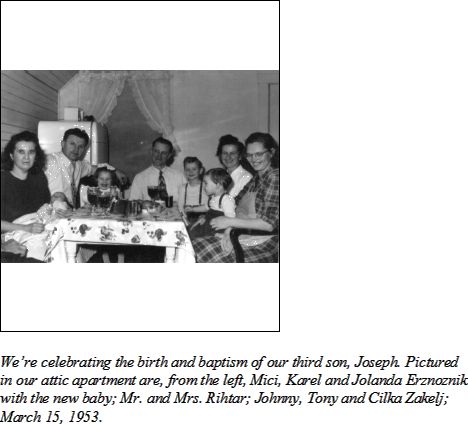
Monday, March 9, 1953
I wanted to stay home to help, but Cilka said she could take care of
everything herself, so I went to work.
Tuesday, March 10, 1953
I drilled threads ("tapping") in 200 pieces. I'm exhausted from
lifting those heavy steel pieces and setting them back down - sometimes more
than three times a minute.
In the evening I took Johnny to Dr. Meršol to look at his ears. The doctor
gave him a shot of penicillin and medicine to take home.
Wednesday, March 11, 1953
Johnny slept well; his ears no longer hurt, but he still throws up
everything he eats.
Saturday, March 14, 1953
I went to the post office to send packages of food and clothing to my father
and Cilka's mother.
Sunday, March 15, 1953
Rain. Mr. Rihtar drove baby Joe and his godparents Mici and Karl Erznoznik
to St. Vitus for baptism. Afterwards, we celebrated in our apartment.
Monday, March 16, 1953
I looked at two houses for sale together on 5516 Carry Ave. The houses look
like they have not been cared for, but the price of $12,000 is not too bad.
Saturday, March 21, 1953
Joseph Globokar, the realtor, has been visiting us every day to encourage me
to buy the two houses.
Sunday, March 22, 1953
We looked at more houses this morning. There was a nice one on E. 75th, but
too expensive at $14,000. In the afternoon, I went to look at 5516 Carry again
with Rudi Drmota, and then again in the evening with Mr. Rihtar.
Monday, March 23, 1953
After much thought, I've decided to buy the houses at 5516 Carry. If I look
at any more, I'll get sick.
Wednesday, March 25, 1953
I'm very tired. I told the foreman that I can't do the tapping by myself any
more. He talked with Mr. Risher, who told the foreman to get me a helper -
anybody I want. I chose Rudi Knez.
In the evening I gave Globokar a $46.27 check as down payment for the
$11,000. Joseph Kovac, a KSKJ board member, promised to come appraise the
houses, and said KSKJ would loan me 50% of the total. Our friend Milica Zonta
promised to loan us $2,000. She hopes to live in one of the houses, but that is
not a condition of her loan. With that and our $4,000 in savings, we have
enough.
Tuesday, March 31, 1953
Mr. Globokar and Mr. Intihar finally came today at 4:30 to look at the houses
on 5516 Carrry. Mr. Intihar promised a loan of $6,500 from KSKJ.
At 8:30 p.m., I went to Globokar's, who offered me wine, but I didn't care
for it. I signed a purchase agreement for $11,500, and got an agreement that
the owner would return the kitchen cupboard, which he had removed. At 9:30, I
returned home as the official owner of two houses.
The purchase agreement is dated for April 1. I hope we will be in our own
home in two months. The worries that almost caused me to become very sick have
disappeared.
Friday, April 17, 1953
We have problems with the loan
from KSKJ. Mr. Kovac said they can't give me more than $5,000. They expect
peace in Korea and a depression. Houses on the north side of St. Clair won't be
worth much. KSKJ wants us to find a new house because we don't know anything
about fixing up old houses. Again, I think I'm getting sick from worry.
Saturday, April 18,
1953
Rudi Drmota said he would loan
us $1,000. Mr. Globokar doesn't understand why KSKJ won't loan us more than
$5,000. He said, "If you know how to read a micrometer in the machine
shop, you'll know how to pound a nail!"
In the evening, I saw Mr.
Intihar at a lecture at St. Vitus school. He agreed to arrange everything so we
would get a $5,000 loan from KSKJ, at 4% interest, $100 per month for 5 years.
Sunday, April 26, 1953
I went downtown and spent
$34.25 for cloth to send to my mother and father in Slovenia.
Cilka is sick again. It seems
we constantly have someone sick.
Sunday, May 3, 1953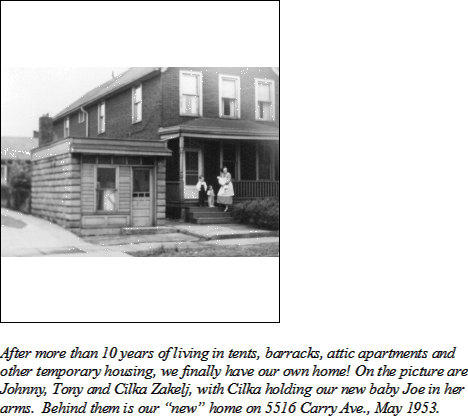
Milica agreed to loan us
$2,500. We signed a contract. Of that, $1,000 belongs to her brother Rafko, and
I have to repay that when he returns from the war. The rest does not have to
repaid for a number of years. We won't need to borrow money from Rudi.
In the afternoon, I took Johnny
and Tony to look at the construction on E. 55th and Lakeshore. They're moving
mountains of garbage and debris to raise E. 55th so it connects with a new
bridge across Lakeshore Blvd. The shacks where the old drunken bachelors used
to live are gone. Everything is changing very fast.
Tuesday, May 5, 1953
Mr. Globokar came to get me at
the shop. We went to sign the papers for the KSKJ loan, then to North American
Bank and St. Clair Savings, where we took out all our savings. Cilka and I
signed the final papers and turned over the money. I have three dollars left.
If all goes well, I think I
will repay all the loans in 5 years, maybe 7 at the most.
Sunday, May 17, 1953
We got the keys to the house and went to look at our future home. It looks even dirtier than before. I was afraid that Cilka wouldn't be happy, but she likes our new house. It will be lots of work, but it will be our home.
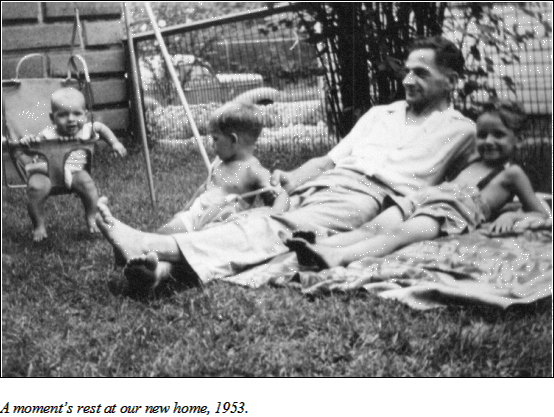
Zakelj Diary Home Page: http://bbhhs96.dyndns.org/~zakeljdiary/